News Clippings from the Past
Part 2
A collection of news clippings from West Coast newspapers during 1942. Courtesy of Yoriko Watanabe Sasaki; in printed form by James Watanabe, M.D.INLAND STATE HEADS DO NOT WANT JAPANESE
Those Who Fled Germany Will Be
Considered When Seattle Hearing
Reconvenes Today
The Tolan congressional committee will resume hearings in Seattle today on the Japanese evacuation issue confronted by telegrams from governors of at least eight Western states declaring their opposition to receiving any transplanted Japanese into their states.
The committee had wired fifteen Western governors asking their attitude toward proposals by committee witnesses that Coast Japanese be evacuated inland. Congressman John H. Tolan, committee chairman, emphasized that the committee itself was not advocating the move and had not yet publicly taken any position on the issue.
GOVERNORS' ATTITUDE
The negative telegrams were from the executives of Wyoming, New Mexico, Idaho, South Dakota, Oklahoma, Nevada, Montana and Arizona.
Perhaps the most emphatic was from Gov. Sidney P. Osborne of Arizona, who said:
"We do not propose to be made a dumping ground for enemy aliens from any other state. We not only vigorously protest, but will not permit the evacuation of Japanese, German or Italian aliens to any point in Arizona. ...They should be removed entirely from the danger belt, which comprises all the states of the Pacific slope."
WYOMING'S POSITION
Gov. Nels H. Smith of Wyoming sent the lengthiest protest, declaring in part:
"The state of Wyoming, while willing to render every assistance in our war program, cannot acquiesce to the importation of these Japanese into our state. In the event the war department proceeds to evacuate the Japanese from the West Coast into Wyoming, it will be imperative that they be kept under strict federal control, supervision and maintenance."
Said Acting Gov. C. R. Quintana of New Mexico:
"We in New Mexico take the position that as a border state New Mexico may become a strategic area, and we therefore oppose such migration. Since New Mexico does not have defense industries we still have a labor surplus."
Gov. Chase E. Clark of Idaho wired:
"Farmers here are very bitter against employing this labor. I am fearful such labor would get hurt. My recommendation is that if enemy aliens are brought to Idaho they be placed in concentration camps under military guard."
DAKOTAN OPPOSES PLAN
Gov. Harlan J. Rushfield said:
"The people of South Dakota do not want evacuated enemy aliens within our borders. None of them will be assimilated in useful work."
Gov. Leon C. Phillips of Oklahoma asserted in his wire:
"We would not be inclined to use them in competition with our own labor."
Gov. E. P. Carville of Nevada gave as his opinion:
"The only plan I consider feasible for this state would be federal government concentration camps... People here do not want enemy aliens coming into the state promiscuously or being allowed to drift to all parts of the state without surveillance."
Gov. Sam C. Ford of Montana said:
"Opposed to importation of enemy aliens to be used as agricultural workers."
When it convenes here today, the committee is expected to con????? ??? problems of German scheduled to testify are expected to discuss the problem of the men and women who fled from Germany or territory captured by the Germans and sought sanctuary here but who are classed as enemy aliens along with other German nationals.
REFUGEE INVITED
Dr. Dolf Simons, a refugee from the Nazis, according to the committee, and Mrs. Clara Nider of the Washington Emigre Bureau, which has aided refugees arriving in Seattle, have been invited to appear it is believed, will, like Saturday's, be devoted to testimony bearing upon the problem of the Japanese residents here and the extent of the economic dislocations that may be expected to follow their removal inland.
Witnesses scheduled to testify include the Rev. Harold V. Jensen, pastor of the First Baptist Church, Miller Freeman, publisher, and Lloyd Schmoe of the American Friends Service Committee. If his health permits, City councilman John E. Carroll, who has been ill, will outline the attitude of
[article abruptly ends here]
ARMY TO DECIDE FATE OF ALIENS, DEWITT SAYS
SAN FRANCISCO, March 1. --(I.N.S.)-- Gen. J. L. DeWitt tonight cracked down on unfounded rumors and so-called "official statements" regarding enemy alien evacuations on the Pacific Coast. Obviously ired at rumors, the commanding general of the Western Defense Command and Fourth Army emphasized that military necessity was the sole yardstick by which the army would select military areas on the Coast.SCORES 'CLAMOR'
"Public clamor for evacuation from nonstrategic areas and the resistance of local organizations and officials that evacuees not be moved into their communities cannot and will not be heeded, for considerations of national security must come first," he declared.
"No one has been authorized to speak for me in connection with my authority under the executive order, and all statements and predictions coming from other sources should be disregarded."
General DeWitt meanwhile praised as "most laudable" the willingness of Colorado's Gov. Ralph L. Carr to accept within the confines of his state those Japanese who must be moved away from the Coast.
URGED AS EXAMPLE
In a telegram to the Colorado governor, General Dewitt said he was "hopeful that the governors of other states in this region will take a similar position" to aid the army in solving the complicated evacuation problem.
The general decided that for two weeks the staff of the Western Defense Command and Fourth Army has been engaged in making final studies to determine the areas to be restricted and the nature of the restrictions to be applied.
A proclamation setting forth these areas and describing their boundaries will be released shortly, under authority granted to the army by President Roosevelt.
The areas set forth in the military proclamation will supersede the prohibited and restricted areas already established by order of the attorney general.
CURFEW IN EFFECT
Enemy aliens already have been evacuated from these prohibited areas and a curfew for thousands of enemy aliens in the restricted areas has been in force since midnight February 24. In commenting upon the various aspects of evacuation, General DeWitt said:
"The appropriate agencies of the federal government are engaged in far-reaching preparations to deal with the problem and a study is in progress by those agencies regarding the protection of property, the resettlement and relocation of those who are affected.
"The completed preparations will include measures designed to safeguard as far as possible property and property rights, to avoid the depressing effect of forced sales, and generally to minimize resulting economic dislocations. As soon as those studies are concluded, definite designation of persons to be affected will be made."
FRED NIENDORFF: Keeping Japanese Lands Producing Offers Problem
Post-Intelligencer Financial Editor
Regardless of when alien and American-born Japanese farmers are evacuated from their lands, "keeping Japanese lands in production is a basic war measure."
This notice has been served on all district officers and field agents of the wartime farm adjustment program by Laurence I. Hewes Jr., regional director of the Farm Security Administration. It touches on one of the most vital problems facing not only the '. Pacific Coast, but the entire war program as it relates to the nation's Food for Freedom campaign.
CROPS NECESSARY
As pointed out by Hewes in his detailed instructions:
"The primary object of the wartime farm adjustment program will be to see that these evacuated lands continue in full production. This is a matter of the greatest importance to the nation and to our war effort. Japanese now produce from 35 to 50 per cent of the vegetables grown in California, and California production in many crops constitutes from a third to two-thirds of the nation's vegetable production."
To which he adds:
"Since increased production under the Food for Freedom program is of vital importance to our military effort -- affecting not only supplies for our army but supplies being sent to Britain and Russia -- keeping the Japanese lands in production is a basic war measure."
VITAL PROBLEM
There can be no question about the validity of this line of reasoning, yet keeping the Japanese controlled farm lands in continued production in Western Washington, and, most likely, elsewhere, is a problem of considerably greater magnitude than might appear to some of the numerous arm-chair strategists and superficial critics who have been raising their voices for "action."
The cold, sad fact -- as any government official who has been dealing with the problem will tell you -- is that the white American farmer is not interested in taking over on the Jap lands where the Japs leave off, simply because truck gardening is not his business, and the average Japanese truck garden is not large enough to accommodate his type of farm operation.
Many a Japanese truck garden operator is willing, in fact anxious, to sell out in anticipation of evacuation -- but there is a great dearth of offers to buy. Some of these lands may be had at bargain prices and unless they are bought up they will find their way into ultimate government custody and trusteeship, and, possibly, out of production. In any event they will not be producing the type of crops they have produced.
PLANT FEED CROPS
As previously pointed out here a government official in close touch with the problem has hazarded the opinion that possibly three-fourths of the currently Japanese-operated truck and berry lands ultimately will be sown to feed crops, i.e., hay, grain, etc.
Hewes points out that in seeking a practical solution to the problem his office is working closely with the army and the Federal Reserve Bank.
In fact, an Associated Press dispatch from San Francisco yesterday states the army has set up a special board (referring to the same agencies) "with the object of continuing full production of the truck gardens of Japanese farmers producing more than a sixth of the nation's vegetables."
Actually, the program, according to Hewes, will operate under the authority of, with funds supplied by, the Western Defense Command and the Fourth Army.
Thus it is made clear that rather than the civil agencies striking out on their own, they are working in full cooperation with the army command in a concerted effort, on a unified program which has for its objectives a mass evacuation of enemy aliens and American-born Japanese with the least damage to the military food requirements of the United Nations.
ARMY IN CONTROL
Such a concerted program also has the merit of placing the army in full control of the "how" and "when" of evacuation, with military considerations always uppermost and in the hands of those most competent to judge precisely what those considerations are.
Thus the information given out unofficially in official quarters that the order of evacuation of Japanese may be to remove those engaged in business and commerce first, and those producing crops, last, would appear to make sense.
Meanwhile, anybody who knows of anybody who would like to buy Japanese farm land will be helping the country by referring them to the Federal Reserve Bank's evacuee property problem office at 808 2nd Ave. Buyers are wanted -- now.
Jap Farmers Warned Crops Must Be Grown By Fred Niendorff
A warning to Japanese potential evacuees that they will be summarily dealt with if they fail to plant or take care of growing crops pending evacuation was sounded here yesterday by Charles M. Ross, field officer for the Wartime Farm Adjustment Program.Ross arrived in Seattle from Portland to supervise installation of the Wartime Farm Adjustment Program in the offices of the evacuee property problem division of the Federal Reserve Bank at 808 2nd Ave.
He called upon Northwest residents who know of Japanese, alien American-born, or any other aliens, who are "lying down on the job of producing crop" to report those guilty either by personally visiting the office or calling Eliot 2732.
PLEDGES ACTION
"We will move to correct the situation immediately," he said. Ross said he is acting under full authority of the Western Defense Command headquarters and that, if necessary, he will move swiftly to place the property under military control.
"That," he said, "is the other side of the picture. "We intend seeing the alien Japanese and American-born are given fair and decent treatment, and that they are not cheated.
"But we won't tolerate for a moment any sabotaging of food production. Those aliens who plant their crops and take good care of them will find themselves in a much better position when the evacuation order comes. "The others, I feel safe in saying, will have cause to regret their refusal to cooperate."
CREDIT CASES
Ross said that where failure to plant is due to inability to obtain needed credit, this situation should be reported by the potential evacuees for their own protection and for the information of government authorities.
Ross stressed the army command's purpose not to allow evacuee-operated lands to go out of production and to deal severely with those who directly or indirectly contribute to lessened production.
BUILDING STOCKS
He said his office had reports that some white owners who have been leasing farmlands to Japanese are seeking to evict them to gain an advantage and that such owners also will be "dealt with" if their actions result in ??? plantings or crop failure. He explained that the government is determined to build up surplus stocks of canned and dehydrated vegetables and ??? that it regards the yield ??? every farm, no matter how ??? as important.
"Where it is necessary for us? to forcibly take possession and turn the operation over to emergency labor," he declared, "it is likely that the cost of the ??? will leave little or nothing to the evacuee. So it is in his best interest to carry on conscientiously until he is ordered to leave. The evacuees who do so will receive the highest cash returns as well as preferred treatment from evacuation authorities."
SPEED ESSENTIAL
He urged all who are to ??? within the evacuation order to do their utmost now, not later, to obtain buyers or lessees for their farms. Those who wait, he added, may find it is too late. If the government has to take over, there is little likelihood there will be anything left from crops for the evacuees.
The Wartime Farm Adjustment program, Ross said, is prepared to advance credit to Americans and non-enemy aliens who wish to take over Japanese controlled truck farms and harvest the crops. This credit, he said, will be made available for the purchase of machinery, seeds, fertilizer, other essential equipment, and the employment of labor.
WHERE TO APPLY
Applicants should inquire at the Seattle office or any of the half dozen or so branch offices that are established in other communities throughout the state.
Ross emphasized that the Wartime Farm Adjustment Program has been charged by the army command with the responsibility of maintaining production, and the assistance toward achieving their objective is solicited from citizen? banks, farm and civic organizations -- in short, anyone who can help.
While opposed to the tearing up of lawns by city dwellers for ??? gardening purposes, Ross said the government is urging all who are equipped with knowledge and experience to raise their own vegetables, and more, if possible, all year.
"The country," he said, "needs all the production it can get."
MORE AREAS ANNOUNCED IN BARRED ZONES
Bridges, Tunnels and Military Centers
Added as Sections Prohibited to
Aliens and Japs
An additional list of strategic points in prohibited Zone A of the state of Washington from which Japanese, Germans or Italian aliens or persons of Japanese ancestry may be excluded was issued yesterday by Lieut. Gen. J. L. DeWitt of the Western Defense Command.
The order designates most of the state's railroad bridges and tunnels as restricted areas.
CASCADE TUNNELS
Included in the order are the Great Northern, Northern Pacific and Milwaukee Road tunnels through the Cascade Mountains. Such highway bridges as that over the Yakima River three miles north of Yakima, over the Columbia at Pasco, bridges over the Snoqualmie River east of Fall City, and the Columbia at Wenatchee and Vantage are in the restricted territory.
Radio stations of Spokane, Walla Walla and Yakima also are barred to alien enemies and those of Japanese ancestry.
Seattle stations were included previously in the ban.
CENTERS ADDED
Military centers and places of strategic importance added to the zone are Felts Field, Geiger Field and Seven Mile Camp, at or near Spokane, all four Ephrata bombing ranges, the Ephrata ground gunnery range and the Harder bombing range near Marengo. Certain section of the cities of Spokane, Walla Walla. Wenatchee, Yakima and Wilbur also are declared to be restricted military areas.
Four More States Designated by DeWitt
SAN FRANCISCO, March 16. --(AP)-- Four more states were designated today by Lieut. Gen. John L. DeWitt, Western defense commander, as military areas and 934 new prohibited zones were set up in the eight Western states now affected by the alien enemy program.General Dewitt issued a proclamation, the second of its kind, naming Idaho, Montana, Utah and Nevada as military areas. In his first proclamation a fortnight ago, California, Oregon, Washington and Arizona were declared to be military areas.
The present situation requires this step "as a matter if military necessity," the proclamation said.
RESTRICTED AREAS
Most of the new prohibited zones are in the four newly designated states, but some of them also are in the restricted and unrestricted zones of California, Washington, Oregon and Arizona.
Under the proclamation military installations, air fields, utility plants, dams, railroad and highway bridges and tunnels and other strategic properties are designated as prohibited zones. Under orders previously issued by the government, enemy aliens are barred from similar areas in states covered by the first proclamation.
U.S. SPEEDS PROGRAM FOR JAP REMOVAL
Evacuation Order Expected From Army
Headquarters in S. F. Within Two
Weeks
By Fred Niendorff
By Fred Niendorff
Steps for the evacuation of alien and American-born Japanese from Pacific Coast military zones were being accelerated along the entire coast yesterday.
Official quarters expected the order for evacuation to be announced from army headquarters in San Francisco within the next two weeks.
In preparation for the move, officials of various federal agencies in Seattle are working feverishly to coordinate their efforts in a massive setup that is expected to speed the evacuation movement and handle the numerous problems the step will entail.
WORK TOGETHER
Under the over-all direction of military authorities the treasury department, represented by the Federal Reserve Bank, the United States Employment Service and the Farm Security Administration are working together to assume the varied responsibilities.
It was expected that within twenty-four to forty-eight hours an announcement will be made that offices representing the three agencies have been set up in Seattle, Tacoma, Mount Vernon, Everett, Bremerton, Raymond, Wenatchee, Yakima, and possibly other communities.
PRODUCTION PROBLEM
The purpose is to provide centers of information and assistance for evacuees in as many locations as possible, based on the estimated evacuee population in the specific areas.
The Federal Reserve Bank will advise evacuees on property problems. It already is functioning in Seattle.
On the shoulders of the United States Employment Service will fall the responsibility of finding employment outside military zones for evacuees.
The Farm Security Administration will lend assistance in locating evacuees on farm lands outside military zones, but it will have other, and perhaps, more serious responsibilities that tie directly into the war effort.
It is disappointed over the few offers from white Americans for farm lands to be evacuated by the Japanese.
This disappointment is shared by other government agencies, for unless the evacuated properties are taken over either by new buyers or lessors a production problem is created.
These agencies make no secret of their desire for cooperation from farm and other organizations in finding new operations for land soon to be evacuated.
Responsible officials yesterday estimated that more than three-fourths of the Japanese-operated truck land in Western Washington will go out of truck production when the evacuation is completed.
In the interim, however, official quarters are considering giving the farm land evacuees from sixty to ninety days after issuance of the official evacuation order to actually vacate their properties.
LAND USE STUDIED
This may not develop, but it is being seriously considered for several reasons. One, to bring the spring crops, including the strawberry crop, to harvest, and (two) to give the Farm Security Administration time to work out plans for placing the evacuated lands into production of other crops.
There is discussion of employing the land for grain and other feed crops, and, if necessary, the extension of credit for that purpose as an inducement to white Americans to take over. The central thought is to not sacrifice production on any producing lands, anywhere, at a time when the production of food is essential to prosecution of the war.
Here's the problem as seen by a spokesman for the government as outlined to the writer yesterday:
PROBLEM OUTLINED
"There are no more drought families that need to be resettled and they have already been resettled or are working in war industries.
"Truck farming is the hardest kind of farming, requiring constant and intense application. It carries little appeal to the white farmer.
"Our survey shows that the housing on most of the Japanese-operated truck lands is not desirable from the American's point of view.
"But the lands must be kept producing. It may be found advisable to combine some of the smaller acreage and create farms large enough to lend themselves to large scale machine operation.
"Eventually three-fourths of these lands will be out of truck production. There will be a shortage of vegetables, measured from the standpoint of what the Pacific Coast is accustomed to.
"We hope, however, to avert the blow to the early spring crops. If the present occupants will carry on their work conscientiously it is quite possible they will be able to harvest and sell their early crops, even the strawberry crop.
UP TO MILITARY
"Besides contributing to food supplies, they will be helping themselves by obtaining additional cash to carry them along.
"This procedure would also enable the Farm Security Administration to perfect plans for seeding of new crops, a situation it is hardly prepared to meet if entire evacuation takes place at once.
"Of course the military requirements are uppermost and if the military authorities should decide the evacuation must take place en masse beginning on any given date, that, of course, is what will be done."
Many businesses that have advanced credit to Japanese farm operators in the form of seeds and fertilizer have been besieging the Federal Reserve Bank evacuee property problem office here for information on how, if at all, their investments will be protected.
Should the sixty-to-ninety-day extension plan be made operative it is likely their equities will be liquidated directly. As to the vegetable supply -- the way it looks now is that the Pacific Coast will not be lacking for fresh produce throughout the early spring and summer months, but that thereafter the pinch will be felt, and severely.
CANNING AFFECTED
Canning operations also will be hard hit eventually for a good part of the Pacific Coast commercial canned pack of vegetables is provided by Japanese-operated farms.
It seems entirely possible that canned vegetables may go on the ration list this year or early next, for it is improbable that with the dire need of transportation for more essential war goods, authorities will permit diversion of a really substantial part of it for the transportation of canned vegetables from distant canning centers.
The outlook for vegetables is somewhat darker than it was a few weeks ago when it was still thought in some official quarters that it would be a relatively simple matter to obtain white American operators and labor to carry on truck production.
It is also apparent that the higher-ups have not yet been able to fully make up their minds as to what is to be done with the evacuees, or, if they have, they are stalling for time to perfect their plans, and that, possibly, may have something to do with the present official consideration of the sixty-to-ninety-day period of grace for farm operators.
There is still talk in official quarters of moving evacuees to irrigated lands in the central and eastern parts of the Pacific Coast states -- a move that has stirred the opposition of the civil population every time it has been mentioned.
BAINBRIDGE JAPANESE KEEP WORKING,
FACE BILL
COLLECTORS
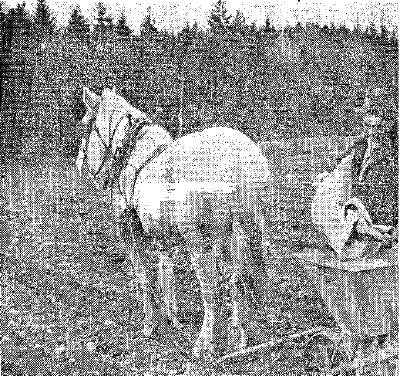
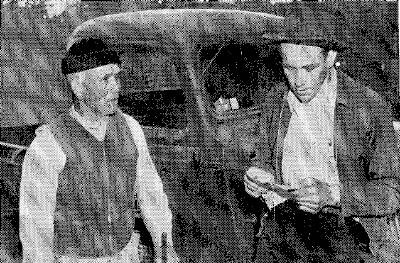

Soldiers Guard Bainbridge, Bar Jap Visitors to Island
Soldiers carrying rifles, bayonets fixed, kept all Japanese from visiting Bainbridge Island today as the Japanese residents of the island prepared to comply with Army orders and register tomorrow for evacuation.Infantrymen patrolled the ferry docks at Willow, Eagledale and White Point, turning back all Japanese who attempted to disembark from the ferries running to the island.
Japanese who attempted to leave the island were questioned carefully before being allowed to board ferries.
Business as Usual
Most of the Japanese, however, went about business as usual, the majority of them working overtime in the well-tilled fields which supply the Seattle area with the bulk of its annual strawberry crop. Pea farmers also were on the job, tending their crops. The few who operate businesses were winding up financial affairs between tending to customers.
With less than a week remaining before they must leave the homes which they have occupied many years, Japanese hoped for a change in military orders, an extension of time, a last-minute miracle -- anything!
As the Japanese were winding up final business affairs, United States army officers and men made swift preparations for registration, which will begin at 8 o'clock tomorrow morning in the building formerly occupied by the Anderson Grocery Store at the old Winslow Dock.
Travelers Challenged
Infantry details, with men carrying fixed bayonets, and officers with pistols at their hips, stood guard at various points on the island.
Visiting Japanese from Seattle and other points were denied permission to step foot on the island and were turned back on the ferries which carried them to Bainbridge.
"We are trying to conduct this evacuation with the least amount of displeasure or discomfort. After all, it is not their fault they are Japanese," said one Army officer on duty on the island. "This is just as unpleasant for the Army as for the Japanese. We've got a job to do and we'd just as soon no one would interfere. Our job is just as much to protect these Japanese as it is to evacuate them."
In charge of twelve registration clerks is Tom G. Rathbone, field supervisor for the United States Employment Service. About a dozen clerks will be on duty from 8 o'clock tomorrow morning until 5 o'clock tomorrow evening. The clerks will represent the Federal Reserve Bank, Farm Security Agency, the State Welfare Department, United States Public Health Service and the United States Employment Service.
Japanese must furnish information concerning their case history in this country, employment and health. Federal Bureau of Investigation agents will fingerprint all Japanese to be evacuated.
None of the Japanese was moving from the island voluntarily. Apparently all the almost 300 alien and American-born Japanese of the island are willing to await forcible ejection. They said they have no choice.
"We have nowhere to go," said the Japanese. "We have no friends or relatives where we can go. We will wait until Monday and see where the government sends us."
No Sign of Bitterness
They said it smilingly. They awaited fresh news philosophically. Their words there not tinged with bitterness, although some of the younger American-born Japanese said they felt that a week's evacuation notice was insufficient.
The Caucasian mind never seems to be entirely able to fathom what may be going on behind the serene faces and the gentle words of the Oriental, born abroad or in the United States. Yet the Bainbridge Japanese spoke frankly:
"It's for the good of the country, so we'll move," said J. Nakata, farmer, who has a son, Momoichi, serving with the United States Army and now stationed in Arkansas. Momoichi is one of seven.
Nakata pointed to the red, white and blue poster in his doorway: "Our Son is Serving in the United States Army." Out in the yard another son, Donald, played with Momoichi's setter, Duke, and wondered what would become of the dog.
Nakata moved to America from Japan in 1900, formerly worked as a barber.
T. Hayashida, spreading fertilizer among strawberry plants, halted his ancient white horse and said:
"They tell you one thing and then they tell you another, and a fellow doesn't know what he's going to do. But if the country thinks it is best for us to move, why, that's all right."
Takashi Sakuma, 22 years old, who was to have been graduated in June as an economics major at the University of Washington, said:
"I expect my draft card today anyhow. When the Army says evacuation is for the good of the country, then I know it's for our own good, too.
"I can easily visualize what would happen to me in another country in time of war. There are a few people who discriminate against us, but I know they are not like the majority of American people."
The Rev. Kihachi Hirakawa, a Japanese Baptist preacher said simply, "I just hope we can live together."
SIX JAPANESE ARRESTED HERE
Six Japanese aliens, including a woman, held by federal authorities to be potentially dangerous, were arrested in Seattle last night.H. B. Fletcher, in charge of the Seattle office of the Federal Bureau of Investigation, said the six all held membership in pro-Japanese organizations. All six were placed in detention quarters of the Immigration Station.
Residences of those arrested were searched, F. B. I. agents said, but no contraband was found.
In Yreka, Calif., F. B. I. agents arrested five Italian aliens and seized six firearms and more than 600 rounds of ammunition yesterday, the Associated Press said.
Bainbridge Japs Leave in First N. W. Evacuation
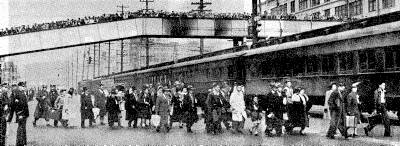
'Moving Vans' PICK UP EVACUEES
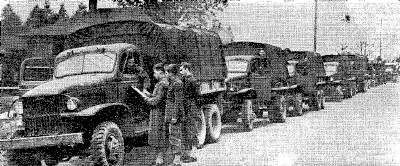
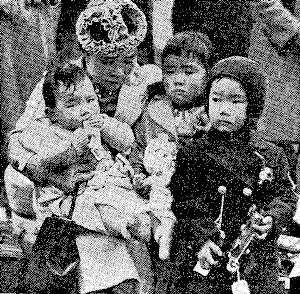
ARMY TO TAKE JAPANESE OFF ISLAND MONDAY
Nipponese to Be Brought Here on
Ferryboat, Then Put on Train for
Manzanar Concentration Camp
Final plans were laid yesterday for the Army evacuation of 239 alien and American-born Japanese from Bainbridge Island "sometime tomorrow," under direction of troops of the IX. Army Corps. Removal of the last Japanese from the island will make it devoid of Nipponese for the first time in half a century.
The evacuees, men, women and children, will be brought to Seattle on a chartered ferryboat, under the close supervision of armed troops, according to plans announced by Maj. Gen. Kenyon A. Joyce's office. The Seattle interlude will be brief, taking only so long as it requires to march the Japanese from the dock to a nearby railroad siding.
A special train of Pullman cars will leave Seattle for the reception center at Manzanar, Calif., as soon as loaded.
Army officials said the voluntary evacuations are over. Although the Japanese could have left voluntarily until tonight, all notified Army authorities that they would accept government transportation rather than go at their own expense and risk.
Cupid Ahead of Time For Nippon Evacuation Special
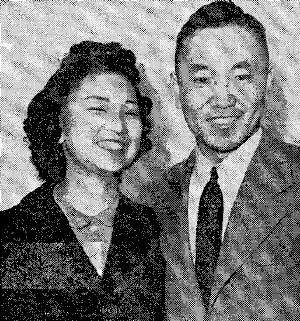
MR. and MRS. ROBERT HOSOKAWA
'We hadn't planned to get married quite so soon'
'We hadn't planned to get married quite so soon'
Love that laughs at locksmiths also smiles at curfew, evacuation orders and travel restrictions. And so, more Japanese names than usual are scattered along the daily lists of those filing notices of intention to wed, which means that many Japanese will be going into the unknown, when definite evacuation orders come, with a companion by their side instead of alone.
There are Robert Hosokawa, 23-year-old Whitman College graduate, and Yoshi Yoshizawa, pretty 20-year-old Willamette University junior from Milwaukie, Or.
"We hadn't planned to get married quite so soon," Hosokawa said yesterday, before the wedding.
"Not today, anyway," interrupted Yoshi.
"But, you see," Hosokawa went on, "those travel restrictions went into effect and I got worried, so Wednesday night I went down to Salem and kidnapped Yoshi right out of school."
"I was waiting for him all the time," whispered Yoshi.
"We just got the license this morning," Hosokawa said, "and we're going to be married this afternoon. Arthur Bateman, a schoolmate of mine who's an attorney, got a waiver so we needn't wait three days---"
"Oh, they were all so nice!"
"And we called up the Rev. Alexander Winston at University Unitarian Church and he said he could marry us at 1:30 or 4 o'clock and we said, 'Make it 1:30' -- we've just got time to change our clothes and buy a corsage. We had to borrow a ring."
"But we'll buy one Monday," said Yoshi, who was wearing a very sparkly diamond engagement ring, not borrowed.
"I'd like to have all my friends see us get married," Hosokawa said regretfully, "but they're all in the Army. Mr. and Mrs. C. E.
Brother at Wedding
Attendants at the little wedding yesterday afternoon were Hosokawa's brother, William Hosokawa, executive secretary of the Japanese-American Citizens' League, and his wife.
Hosokawa, a salesman, is the son at Mr. and Mrs. Setasuzo Hosozawa, 158 22nd Ave., and his bride is the daughter of Mr. and Mrs. T. Yoshizawa, who were not able to come up for the wedding. Both families are awaiting evacuation orders.
There was a double wedding Thursday; when Toraichi Sao, 29-year-old salesman living at 1212½ Main St., and Hatsume Murakami, 23, of Auburn, were married at the same time as were Hatsume's brother, Keo K. Murakami, 25-year-old Auburn produce man, and Yukiko Kato, 26, of Kent. The Rev. U. G. Murphy of the American Bible Society officiated.
'We'll Go Together'
"I got worried about the travel regulations, too," Sao said. "And then we thought wherever we go, we'll go together. Her brother and his bride felt that way, too, and now we hope all four of us can go to the same place."
During the past few days notices of intention to wed were also filed by Motoi Naito, 24-year-old former University of Washington student, 507 Tenth Ave., and Lillian Haruye Ichihara, 20, 862 20th Ave. S.; Oliver Kinomoto, 22-year-old restaurant man, 111 12th Ave., and Suye Tsutsumi, 22, 312 14th Ave. S.; Frank Y. Torihara, architect, who was graduated from the University, 123 17th Ave., and Ruth S. Matsumoto, 1815 Lane St. Also filing were Akira Mayeda 27, 855 20th Ave. S.. and Taeko Nikami, 21, 3020 23rd Ave. S.; Masami Satomi, 22, of National, and Chijoko Uyeda, 20, 1018 E. Alder St.; George Shigeo Abe, 25, Snoqualmie Falls, and Dorris Sumi Akimoto, 22-year-old former University student, 1016 E. 45th St. Joe Tamura, 21, Route 9, Box 10-H, and Mabel Uno, Puyallup; Kanichi Iwami, 24, 816 Union St., and Sachiko Sumioka, 20, 1211½ Main St.; Koyi Norikane, Auburn, and Mary Shizuko Hiramatsu, Kent. Other Japanese filing were Chajo Yabe, and Yao Kaboyashi, both 64, 415 Sixth Ave. S.; Al Takaono, 25, 115 18th Ave., and Misao Morimoto, 25, 1221 Remington Court; Takeo Muramoto, 24, 1820 Jackson St., and Rosemary Kikuno Oshio, 23, 1423 King St.; K. Takasugi, 46, 604½ Main St., and F. Itano, 45, 502 Main St.
MONDAY, MARCH 30, 1942.
ORDER 'FREEZES' ALIENS ON COAST
Up and down the Pacific Coast today more than 100,000 Japanese, both alien and American-born, and another 150,000 enemy aliens were "frozen" to their home communities as authorities began enforcement of the fourth public proclamation of the Army's Western Defense Command and Fourth Army.All voluntary evacuations had ended today, and all aliens in the future must remain in their communities by daylight and their homes at night until the Army completes plans for their mass removal from coastal areas.
The Army, removing Bainbridge Island's Japanese, announced that only a small minority of aliens along the coast had taken advantage of the voluntary evacuation which was allowed until last midnight.
Fair Grounds Converted In Washington, workmen were working three shifts a day to convert the automobile parking lot at the Western Washington Fair Grounds, Puyallup, into a huge evacuation center similar to those at several California fairgrounds.
It appeared likely that compulsory removal of the remainder of Washington's 8,000 Japanese is awaiting completion of this center, expected to require about four weeks.
Only six classifications are exempted from these and future exclusion orders -- German and Italian aliens more than 70 years old; German and Italian aliens who are parents, wives, husbands or children of an officer, enlisted man or commissioned nurse on active duty with the Army, Navy, Marine Corps or Coast Guard; German and Italian aliens who are parents, wives, husbands or children of an officer, enlisted man or commissioned nurse who has died in the line of duty on or since last December 7, German and Italian aliens who had paid the filing fee for naturalization before December 7; patients too ill or incapacitated, or inmates of orphanages and the totally deaf, dumb or blind.
In Oregon, the curfew was headed for a court test. Minoru Yasui, 26 years old, an American-born Japanese attorney, surrendered to Portland police to test constitutionality of the curfew proclamation.
ALIEN CONTROL FORCE SET UP FOR COAST AREA
By Associated Press.
SAN FRANCISCO, March 14. -As a step toward solving the enemy control problem, the Army announced today the creation of a wartime civilian control administration to be known as the Civil Affairs Branch.
Lieut. Gen. J. L. De Witt commander of the Western Defense Command and the Fourth Army, announced establishment of the new branch of the general staff. Lieut. Col. Karl R. Bendetsen of the War Department general staff was assigned to head the new branch as, assistant chief of staff, responsible to General De Witt.
Offices are to be opened throughout the area from which Japanese and German and Italian aliens will be moved. These branch offices will handle the multitude of problems attendant on the movement from affected areas. A central office is located in the Federal Reserve Bank in San Francisco.
The Federal Reserve Bank is in charge of property protection, and in this respect John Lawlor, assistant to the secretary of the Treasury, will direct conservation of business, residential and intangible, properties owned by those to be moved from the Western the- [missing section??] Federal Bureau of Investigation agents, in their third extensive round-up of enemy aliens in California yesterday and today, have jailed more than 300 Japanese and 17 Germans. The raids were continuing today.
A midnight count listed 252 Japanese in custody in Los Angeles, 16 each in San Diego and Fresno, all Japanese and 17 Germans in San Francisco.
More than 400 Pacific Coast Japanese aliens reached Santa Fe, N. M., today and were hustled off to the detention station for internment. Most of the Japanese arrested were Buddhist priests and teachers in Japanese-language schools, which had been closed since December.
The Dies committee charged recently that textbooks teaching fealty to Japan had been substituted for state-approved books. Japanese children attended public schools by day, Japanese classes at night.
One of the priests arrested here was Taigaku Uyeshima, 49 years old, head of a Buddhist organization mentioned by the Dies Committee.
Harold Nathan, F. B. I. chief at San Diego, said Japanese arrested there had taught subversive doctrines.
In San Francisco. Nat J. L. Pieper, F. B. I. agent in charge, reported "the persons taken into custody are definitely considered dangerous."
San Francisco agents seized Nazi Bund membership books, Nazi propaganda, Swastika flags and miniature figures of Hitler.
Two previous round-ups netted some 700 aliens, most of them Japanese.
Japanese Paper Ordered to Quit, But Backs U. S.
After 39 years of continuous daily publication, there was no edition yesterday of The North American Times, Japanese-language newspaper, by order of the United States Treasury Department.The newspaper's publisher, Sumiyoshi Arima, an alien, is in custody of the Federal Bureau of Investigation, causing suspension of publication, according to Bud Fukei, editor, 1175½ 12th Ave. Fukei said about 50 Japanese-Americans and aliens were employed.
Disappointment over the closing order was expressed in a page-one editorial of the final edition. It said, in part:
"...We felt it was vitally necessary to have The Times continue, at least until evacuation... We hope Japanese readers will not lose confidence in the United States and continue to support the cause for which the United States is fighting..."
With an English section, The Times had a circulation of about 9,000 copies.
Japanese Problem
To The Post-Intelligencer:Is Mr. Mason being ironical or frankly brutal when be proposes that we deal with the Japanese as we did with the Indians? Does he think our treatment of the Indian makes pretty reading? It is evident the only solution he offers is to make the Japanese jump off the deep end. Is that the democratic way of life?
We face not only this problem. How about the Negroes who have been discriminated against and denied jobs in defense work? We will either solve these problems in the Christian way or reap the whirlwind, for "whatsoever a man soweth that shall he also reap" is as true of nations as of individuals.
MRS. FRIEDA C. DAVIDSON, Seattle.
To The Post-Intelligencer:
Why so much controversy over the Japanese situation? Let the proper authorities take care of it as they will take care of the evacuation of the rest of us when the time comes.
When we are evacuated that will be something to cry over, for we are Americans, many of us fifth generation Americans. Since the Revolution our people have fought and died to keep our way of life. We will do our part without a murmur. Let these few people who are now a menace to the safety of the city play the game with us and let's leave the sentiment for those who will indeed suffer. L. A. O., Seattle.
13 ALIENS SEIZED IN F.B.I. RAIDS
While raiding homes and business establishments in search of contraband in the vicinity of Tacoma, agents of the Seattle office of the Federal Bureau of Investigation yesterday arrested one Italian and 12 Japanese aliens.H. B. Fletcher, agent in charge of the Seattle F. B. I. office, said all the aliens submitted peacefully to arrest. Agents reported that the twelve Japanese were arrested because of their "activity in pro-Japanese associations." The Italian was arrested "because of his activities." No contraband was found, he said.
Fletcher said another Italian alien was arrested in Seattle because he had a pistol in his possession.
A Japanese was arrested near Blanchard, Skagit County, and brought to Seattle for detention at the Immigration Station. He was accused of activity in pro-Japanese societies. The Tacoma Japanese and Italian also will be held in the Immigration Station here.
In San Francisco, according to the United Press, Tom Clark, Western alien coordinator, said the first evacuation order for Pacific Coast enemy aliens and Japanese Americans will be issued "in a matter of days," but only after shelter has been provided for needy evacuees.
Meanwhile, as British Columbia authorities planned to move Japanese from certain coastal areas, beginning tomorrow, Gov. Chase A. Clark of Idaho appealed to Idaho citizens to refuse to sell land to Japanese ordered out of coastal defense areas.
Clark Urges Guards
"If we let them come now, and by purchase of land, settle themselves here, we will soon be sick of them," Governor Clark said. "I have urged that Japanese who may be sent here be placed under guard and confined in concentration camps for the safety of our people, our state and the Japanese themselves."
Governor Clark explained that while he had informed the federal government of willingness to conform to any final authoritative orders, he was not "ready to sell out the state of Idaho to the Japanese for a few dollars..."
While the evacuation of United States coastal areas has not yet begun, Army authorities have made it clear that all nationals of Japan, Germany and Italy, as well as American-born Japanese, soon will be ordered inland.
Clark said that while no evacuation orders have yet been issued, this is because the issuance of such orders will not precede preparation of shelter facilities. After the first evacuation order is issued, "in a matter of days," other orders will follow "in orderly but rapid succession," he said.
The Army established a Wartime Civilian Control Administration to handle all phases of the forthcoming removal of the aliens and American-born Japanese. Lieut. Col. Carl Bendetsen of the Army
[article abruptly ends here]
B. C. to Move 2,500
The British Columbia evacuation will remove all Japanese from districts north and west of the lower mainland district around Vancouver. Nine coastal steamers will be used.A total of 2,500 Japanese at 60 points along the mainland and Vancouver Island will be picked up and taken to Vancouver, where they will he held until accommodations outside the coast-defense zone are ready for them. In addition, 607 Japanese from Northern British Columbia will assemble at Prince Rupert, to be taken to Vancouver.
At the same time, the United Press reported that the clamour for swift action in the defense of British Columbia was rising in the wake of new warnings that the Japanese may attack the Pacific Coast and that some provincial cities were pressing plans to organize and train guerrilla bands to fight any invasion attempts.
In Vancouver, a citizens' committee has been formed to aid in recruiting 4,000 men to bring a reserve brigade to full strength in the coastal area. Maj. Oscar Erickson, president of the Canadian Corps, said "it is up to every man who is able to pull a trigger to learn to use weapons, from rifle to trench mortar."
First Group of Coast Japs Interned in N. M.
SANTA FE, N. M., March 14. -- (UP) -- The first contingent of Pacific Coast Japanese, numbering about 400, arrived here today and were trucked to a barbed-wire surrounded former Civilian Conservation Corps camp near Santa Fe for internment for the duration.The Japanese, who arrived by special train from San Francisco and Los Angeles, silently filed from the train under armed guard as a few curious spectators watched the proceedings.
The camp is the second in New Mexico housing enemy aliens. More than a year ago 400 seamen of the scuttled German liner Columbus were interned at a C. C. C. camp near Fort Stanton.
17 Enemy Aliens, Contraband Seized
ATLANTIC CITY, N. J., March 14. -- (UP) -- Federal Bureau of Investigation agents arrested 17 enemy aliens in Atlantic and Cape May Counties tonight, and seized enough paraphernalia to fill a room.Japanese, Germans and Italians were arrested in a number of raids, which were conducted by 20 agents with cooperation of local police.
HIGH OFFICIALS TESTIFY AT TOLAN COMMITTEE HEARING
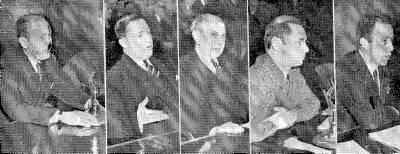
[left to right]
GOV. ARTHUR B. LANGLIE Says state favors evacuation
MAYOR EARL MILLIKIN "That's their hard luck"
J. W. SPANGLER Calls for quick action
FLOYD OLES Suggests guard at every third fence post
MAYOR HARRY P. CAIN Says Tacoma has small problem
GOV. ARTHUR B. LANGLIE Says state favors evacuation
MAYOR EARL MILLIKIN "That's their hard luck"
J. W. SPANGLER Calls for quick action
FLOYD OLES Suggests guard at every third fence post
MAYOR HARRY P. CAIN Says Tacoma has small problem
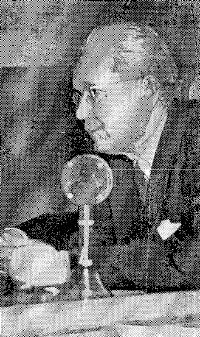
CONGRESSMAN JOHN H. TOLAN
"I might say, it won't be long now"
"I might say, it won't be long now"
Discuss Curfew MANY AFFECTED
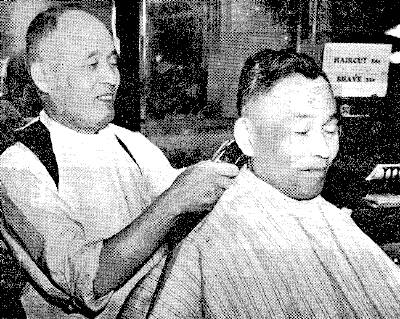
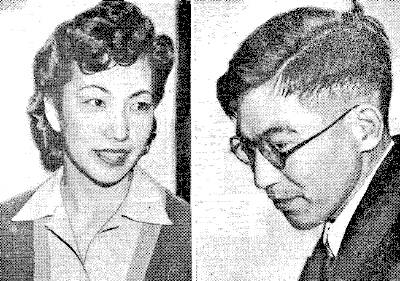
Curfew Violator To Face Charges
PORTLAND, March 30. --(AP)-- United States District Attorney Carl Donaugh filed an information today against Minoru Yasui, American-born Hood River Japanese, for violation of the curfew law, and said the twenty-six-year-old attorney held a reserve commission in the U. S. army.Yasui walked into the Portland police station late last night in what he said was an effort to test constitutionality of the curfew law.
SEATTLE POST-INTELLIGENCER, SUNDAY, MARCH 1, 1942
Tolan Sees Early Ouster of Aliens
AT JAP PROBE HERE
AT JAP PROBE HERE
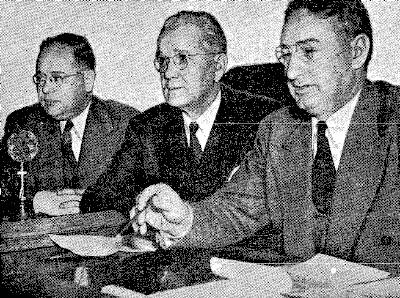
Congress Committee Holds Hearing On Evacuation Problems
By Dan B. Markel
"Evacuation may happen at any time. It won't be long now; I'm sure of that," said Congressman John H. Tolan at the conclusion of his committee's hearing here yesterday on alien removal problems.
Tolan's remarks came after a dozen witnesses, including Gov. Arthur B. Langlie, Mayor Earl Millikin of Seattle and Mayor Harry P. Cain of Tacoma had been heard, and while D. K. MacDonald, President of the Seattle Chamber of Commerce, was on the stand.
MacDonald had emphasized that the chamber had taken no position on the evacuation issue except to urge that the war, navy and justice departments "announce a decision without delay."
"When evacuation does come there will be a whirlwind of confusion, even under the most favorable circumstances," said Tolan, who made no secret of the fact early removal is anticipated.
"It will result in hardships, dislocations, perhaps to some people who have no wish to do harm. Perhaps the best observation is the old one: 'War is hell.'"
Congressmen Carl T. Curtis of Nebraska and Laurence F. Arnold of Illinois, the other members of the committee here, made no closing comments but throughout the hearing took an active part in questioning witnesses.
P. T. A. STATEMENT
They also indicated interest in two statements presented in writing.
One, from the Seattle Council of Parent-Teacher Associations, read:
"We, the executive committee of the Seattle Council of Parents and Teachers are in favor of direct action by the government toward the evacuation from this state of all aliens and the American-born children of all aliens whose home governments are at war with the United States, as a protective measure for all children."
The word "all" was underlined. Mrs. Dale J. Marble, president of
[article abruptly ends here]
King St. Station 'Red Caps' Now Are Filipinos
Japanese "red-cap" porters at the King Street Station today were replaced by Filipinos who have undergone a two-week training course to learn their duties, it was announced by F. E. Bisbee, station superintendent.The station is operated jointly by the Great Northern and Northern Pacific Railroads. Bisbee said the new red caps will wear large identification buttons reading "Filipino."
The Great Northern Railroad also announced that Japanese red caps at the Vancouver, B. C., station have been replaced by white Canadian citizens. The Union Station recently replaced its Japanese red caps with Negroes.
Let Japs Bet on the Ponies - With No Races on the Square
By HENRY
McLEMORE
NEW YORK -- The government is on the right track at last in dealing with the Japanese in California.
Pictures from that state reveal that the Santa Anita racetrack, world's biggest home of the sport of kings and suckers, has been converted into a detention camp and thousands of evacuees will be housed there while awaiting assignment to permanent centers.
The government needs to take but one more step to make this set-up perfect. Bring in some horses and resume racing at Santa Anita.
Racing was called off at Santa Anita earlier in the year as a war measure. It is my contention that it now should be reinstated -as a war measure.
It doesn't make sense to have that many Japanese suckers living at a racetrack without seizing such a royal opportunity to take their money away from them. Japanese are born gamblers anyway, and it would be only a matter of time until the horses had taken enough from the Japs' kimono pockets to buy a raft of Defense Bonds.
SANTA ANITA for the Japanese would not need to be run exactly as Santa Anita was run for Americans before the war. It was strictly legitimate then, with everything on the up and up. But, for the Japanese, who proved at Pearl Harbor that they enjoy a bit of the old trickery, Santa Anita could be operated with a few cute touches guaranteed to separate them from their yen.
The official, trained Santa Anita starter could be replaced by a man who had a son serving on a submarine in the South Pacific. This would insure that the horse the Japanese aliens had installed as a favorite, and were backing with heavy dough, would get none the best of it when the field was sent away.
The complex, foolproof photo-finish camera could be taken out and a 1910 box-type Brownie No. 1 installed. As this type of camera has difficulty catching any object that moves faster than an equestrian statue, the Japs couldn't count on too fair a shake in a blanket finish.
The number of races on the program could be increased from eight to just as many as could be run between sun up and dark. Post time for the first race would be 6 a. m. and the last one wouldn't be run until just before the sun went down.
No Jap, no matter how smart a handicapper, could lick such a program. It requires genius to beat an eight-race program, as so many of us know. Not even a horse player who combined the talents of Leonardo de Vinci, Thomas Edison, Socrates, and Roger Babson could hope to escape defeat from a 30-race card.
To make it even tougher for the Japs, all the disbarred jockeys, trainers and owners in the country would be extended an invitation to go to Santa Anita and give the Nipponese a thorough going over.
The saliva test business would be abandoned and any horse that didn't actually do a jitterbug dance as he crossed the finish line would be packed as normal. Instead of giving a watch to the jockey who rode the most favorites during the meeting, a grandfather's clock would be awarded the rider who pulled up the most favorites.
Dye jobs would be readily accepted and trainers would be as busy as mothers before Easter, brewing up various tints. Welshing bookmakers would be greeted with open arms and allowed to do as much business as they could.
The big race of the year would be the Hari-Kari Handicap. Every Japanese naturally would prepare himself for a big killing. At the last moment, unbeknownst to the Japanese, some fine horse like Whirlaway or Alsab, would he shipped in and his name temporarily changed to something that would keep the Japs from betting on him.
A name like Tokyo-In-Ashes the 2nd, with a breeding by Bomber out of Alaska. Or, Japan-Is-Licked, by 1944 out of Natural Resources. Not only would the money raised at Santa Anita under this scheme come in very handy for the government, but think of how Tokyo would appreciate the treatment of its subjects in this country when word got back there that all they did was to go to the horse races from morning until night.
Still a Melting Pot
If anything ever illustrated the repute of these United States as a melting pot of divers races, it was the recent evacuation of Japanese residents, American and foreign born, from the pleasant countryside of Bainbridge Island. For one thing, many of the Japanese farmers left their properties in full charge of friendly Filipinos, delegated to carry on for the duration of the war.American boys, with names smacking strongly of the fjords of Norway or of Sweden, played "hookey" from Bainbridge island schools to bid farewell to their departing Japanese classmates. Among the Japanese were some of the best baseball players of the Bainbridge High School, wearing the sweaters and insignia of their school.
And added to all this was the kindly consideration manifested by young American soldiers, themselves bearing names disclosing a polyglot European ancestry, helping the aged Japanese evacuees and carrying the baggage of Japanese families heavily laden with personal possessions.
The Japanese departed from their homes cheerfully, knowing full well, most of them, that the measure was designed to help preserve the precious, kindly camaraderie among divergent races which is one of this country's great contributions to humanity.
Japanese At Maryknoll To Be Evacuated
Japanese children at Maryknoll School, conducted by the Maryknoll missionary priests, will be evacuated with their respective families when evacuation orders come, Charles Burdell, representing Tom Clarke, chief of the civilian staff, Western Defense Command, said today.
It first had been planned to send the children and their families en masse to Catholic parishes in the Midwest and East, but the idea has been abandoned. Burdell said as far as he knew the children would be evacuated with their families as will other Japanese.
The Rev. Leopold Tibesar is head of the school. Maryknoll priests conduct Catholic schools for Japanese children in various sections...
Jap Students At U. Transfer To Inland
Schools
The Universities of Michigan, Minnesota and Chicago are among Middle Western schools to which Japanese students of the University of Washington transferred before the voluntary evacuation period ended Sunday, it was learned today.
Meanwhile, Japanese students still on the campus and in Seattle registered yesterday at the university for possible matriculation at Middle Western institutions after evacuation.
Robert O'Brien, assistant dean of arts and sciences, was in charge of the registration for Washington and Oregon. Students who are evacuated, O'Brien said, will receive part credit for that portion of the spring quarter completed before their removal. They are expected to be able to enroll at inland schools next fall, he added.
The government paid transportation and matriculation costs of students transferring to Middle Western schools in cases where they were unable to do so, O'Brien said.
THEY DIDN'T HAVE ANY RETREADS AT VALLEY FORGE EITHER
By Ding
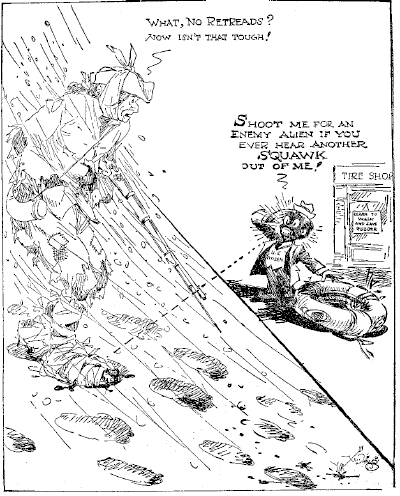
Japs Planning Sabotage In U. S. Soon, Says Solon
WASHINGTON, March 7. --(AP)-- Asserting that the Japanese "timetable" calls for the commencement of sabotage action on the West Coast about April 15, Representative Hinshaw, Republican, California, called on the administration today to "stop fiddling around" with the West Coast problem.Unless quick action is taken to evacuate all Japanese and other enemy aliens from the West Coast, Hinshaw said in a statement, "so great a sin" may have been committed that "even history may never forgive" the administration.
The Californian said he had word that Japanese plans call for a major attack on Hawaii and West Coast sabotage next month. His information, he added, came "from a source which has been heretofore reliable, though unheeded by our government."
Powerful Transmitter Seized in New Mexico
ALBUQUERQUE, N. M., March 7. --(AP)-- A powerful short-wave radio transmitter was in the hands of federal agents today after swift raids, beginning before dawn yesterday, produced other contraband and scores of enemy aliens.The big transmitter was seized by agents late last night in a continuing round-up of alien Japanese, Germans and Italians and seizure including firearms, ammunition, cameras and radio sets. Radio technicians said the transmitter was capable of broadcasting around the world.
Federal Bureau of Investigation agents declined to say whether arrests were made.
Japanese Moving Eastward In Droves
PHOENIX, Ariz., March 6. --(I. N. S.)-- West Coast Japanese are moving eastward in droves, the Arizona state highway patrol said today.During the past week the patrol checked more than 100 automobiles in which the Japanese were riding eastward, mostly bound for Chicago.
Midwest Beet Growers Want Japanese Workers
MINNEAPOLIS, March 7. --(AP)-- B. J. Klinkhammer of Stewart, Minn., President of the Minnesota Beet Growers' Association, suggested at a meeting last night that efforts might be made to bring Japanese evacuated from the West Coast area to this section to work in sugar-beet fields.87 CALIFORNIA ALIENS ARRESTED
SAN FRANCISCO, March 7. --(AP)-- Federal Bureau of Investigation agents detained additional prisoners today after the most far-flung drive in several weeks against possible fifth-columnists in Northern California.Eighty-seven aliens, all Japanese, were arrested yesterday in raids on 31 cities. The F. B. I. said the round-up, which was directed particularly against, members of two Japanese secret societies, was being continued this morning in the same general localities.
F. B. I. men moved as the Army worked out details of a new order, to be issued soon, that will clear aliens and American-Japanese from certain prohibited military areas in California, Oregon, Washington and Arizona.
Reception Centers Ready
The Army already has established two reception centers for evacuees in Southeastern California, one in the Owens River Valley, and another alongside the Colorado River in the Parker Dam-Blythe district.
The Western Defense Command and Fourth Army headquarters said that evacuation plans would attempt to minimize the disruption of normal life among both those required to move and those remaining in the affected regions.
"The Pacific Coast program is proceeding along American lines, in accordance with Gen. John L. De Witt's plan of tempering stern military necessity with every practicable safeguard for individual and property rights," the Army stated.
Inside the resettlement areas, the Army said, the evacuees will be allowed to live with a "minimum of restraint."
Raids Widespread
While announcing evacuation preparations, the Army pointed out that evacuation from military areas had not yet been ordered.
F. B. I. agents described the raids, begun at dawn yesterday and extending from Salinas to Red Bluff, as the most sweeping since the coast-wide sorties of February 21. Some 150 F. B. I. men, armed with 150 presidential warrants and assisted by local authorities, composed the raiding forces.
The F. B. I. said it had evidence that one of the secret societies whose members were sought had operated to provide persons to serve in the Japanese army and navy, and that the other society reportedly collected money for Japanese military purposes.
JAP OUSTER HITS OYSTER INDUSTRY
OLYMPIA. March 5. --(UP)-Washington's oyster industry, which produces 90 per cent of the oysters on the Pacific Coast, is headed for difficult times as a result of impending evacuation of Japanese oystermen predicted today.Virtually all the labor employed by the industry is Japanese, since the Americans have shown little desire to work the oyster beds or in the opening houses and canneries. Washington produces more than $1,000,000 a year worth of Japanese or Pacific oysters and $250,000 worth of the highly-respected Olympia oysters, all of which are grown in Puget Sound or Willapa and Grays Harbors.
Labor Shortage Due
Oystermen of this area predicted they would have difficulty in finding white men to work the oyster beds and canneries when the Japanese are evacuated. Slowing-down of the industry will hit the Pacific oyster growers harder than the Olympia, since the larger variety mature faster.
E. N. Steele of Olympia, one of the Pacific operators, declared war with Japan cut off the supply of Pacific oyster seed.
This will not be serious, however, because many seed are being produced now in Washington waters," he said. "Growers are trying to catch some of the seed now that they cannot buy them from Japan.
"There will be a shortage of oyster workers when the Japs are evacuated, even though we can find white men who know how to do the work. White men do not like to work the night tides in winter, for some reason."
All Union Workers
Steele said there were more than 50 Japanese employed in this area and several hundred over the state. All of them belong to the A. F. of L. Oyster Cannery Workers' Union and draw good wages, so the wage problem for white help to replace them will not force prices up.
George Draham president of the Olympia Oyster Company, said the oyster industry slackens off during summer months and will not be so hard hit by Jap evacuation as if it came in the fall or winter.
Lack of pickers in the beds will not hurt the valuable Olympia oyster crop since they will live several years without losing marketability.
Unwanted Aid
The American Civil Liberties Union is trying to thrust itself into the question of what should be done about alien enemy residents of Pacific Coast states and American citizens who are offsprings of such aliens.With a characteristic blare of prejudice, Roger Baldwin, head of the Civil Liberties Union, denounces as unprecedented and unwarranted the executive order of President Roosevelt establishing military areas from which, at its discretion, the Army may remove aliens and citizens of alien ancestry.
Mr. Baldwin also announced that branch offices of his organization in Pacific Coast cities have been instructed "to assist in protecting the civil rights of Japanese American citizens."
Much might be said in rebuke of the effrontery of the Civil Liberties Union; but nothing could be more to the point than what already has been said editorially in The Japanese American Courier, published in Seattle for many years.
No need to quote precisely nor in full, what The Courier says in substance is that the Japanese in this area repudiate the suggestion that the executive order was not in order, as a reflection on the honor of the President. It goes on to reject the proffered aid of the Civil Liberties Union, saying, "The Americans of Japanese ancestry on the Pacific Coast are fully informed of their rights under the law, and capable of presenting them to those in authority... They have full confidence in the courts."
We cannot be sure that this attitude will wholly discourage the Civil Liberties Union. Though comparatively at ease since shaken up by the Dies committee, its old propensity for making mischief seems flaring up again.
Civil Liberties Group to Contest Removal of Japs
NEW YORK, March 4 --(AP)-- The American Civil Liberties Union today asked its California branches to try to obtain modification of an order to evacuate all Japanese, United States citizens or aliens, from the Western Coast.The area was designated yesterday as a military zone.
The union said in a statement that the order was "far too sweeping to meet any proved need" and should be modified to give hearings for citizens before evacuation.
If military necessary made modification impossible, the union added, then martial law applying to all citizens should be declared.
The union said the order raised issues of constitutional rights, and it offered to go to court in behalf of evacuees involved to test its validity. The group asserted it would not "be interfering with necessary defense measures but challenging unnecessarily sweeping powers" should such court action materialize.
SPOKANE. March 4. --(AP)-- County Prosecuting Attorney Carl Quackenbush called a meeting of Spokane business and civic leaders to discuss what he said were plans to "make the Spokane area a dumping ground" for enemy aliens evacuated from the Pacific Coast.
Quackenbush and other prosecutors of the state attended a meeting on the subject in Olympia yesterday, and the Spokane attorney said that protests "are being filed" by all other prosecutors of Eastern Washington counties.
NON RESTRICTED AREA
"We were told," he said, "that Eastern Washington has been designated as a nonrestricted area, with the exception of Grand Coulee and Long Lake power dam.
"In other words, the Inland Empire may become the dumping ground for evacuated aliens of the state of Washington, numbering between 30,000 and 40,000." Representatives of the chamber of commerce, district attorney's office, city council, county commissioners, state patrol and civilian
[article abruptly ends here]
JAPS RESIDE NEAR VITAL PLANTS HERE
Hundreds of alien and American-born Japanese in Seattle are living near strategic defense units, a police survey showed today.Approximately 7,000 of them live in the central part of the city in a belt between Denny Way and Holgate Street, the survey showed.
Others are scattered throughout the rest of the city, except where zoning law forbid them.
There are Japanese in the neighborhood of every reservoir, bridge and defense project. The survey, conducted by C. E. Neuser, in charge of the police national-defense detail, occupied 28 policemen five weeks. Each Japanese family in the city was questioned about citizenship, firearms length of residence in the United States.
Police statistics show the distribution of Japanese as follows:
University District, east of Roosevelt Way, has 298 Japanese.
The area within a radius of five blocks of the Volunteer Park reservoir has 54 Japanese.
Five Near Boeing Field Harbor Island, center of shipbuilding, has 21 Japanese residents.
Within four blocks of the south border of Fort Lawton are 12 Japanese.
In the ten square blocks north of the government locks in Ballard are 13 Japanese.
In the four square blocks south of Boeing plant No. 2 are 28.
On Beacon Hill, overlooking Boeing Field, are five.
Harbor Avenue Southwest between West Hanford Street and Bronson Way, has 39 Japanese residents.
Alaskan Way, between Holgate Street and Denny Way, has 28.
The heaviest concentration in the central district is in an area bounded by Yesler Way, Marion Street, 23rd Avenue and Elliott Bay.
Japs Retaliate By Arresting U. S. Citizens
BERLIN (From German broadcasts), March 6. --(AP)-- German dispatches from Shanghai said today a number of prominent United States and British citizens, including newspaper correspondents and business men, had been arrested by the Japanese in Shanghai.The arrests were described as reprisals for the treatment of Japanese in the United States.
"These persons will be treated well although they are under arrest," the report said, "and compared with the Japanese arrested in the United States they are enjoying quite a number of privileges."
FREEMAN CALLS JAPAN SOCIETY '5th COLUMN'
Seattle Publisher and State Attorney
General Demand Evacuation at Tolan
Hearing
Prominent officials of the United States government, lawyers, educators, ministers, peace advocates, and members of the Japan Society of Seattle, are "being played for suckers" by the Japanese government, Miller Freeman, publisher and former member of the Washington State Planning Commission, told the Tolan committee yesterday.
The congressional group concluded its public hearings on the multiplicity of questions connected with the proposed evacuation of certain groups from defense areas.
FAVORS OUSTER OF ALL
Other developments yesterday were:
1 - State Attorney General Smith Trop urged evacuation from the Coast region of all Japanese, American as well as foreign-born.
2 - The Rev. Harold V. Jensen, representing the Seattle Council of Churches, urged that Japanese be not evacuated except for military necessity and suggested that should evacuation be ordered, professional social workers be engaged to assist in carrying it out.
John H. Tolan, congressman from California, chairman of the committee, was forced to depart before the afternoon session. He was succeeded by Congressman Laurence F. Arnold at Illinois. Sitting with him in the fifth floor courtroom of the United States courthouse were Congressman Carl T. Curtis of Nebraska and George H. Bender of Ohio.
OFFICE TO STAY OPEN
Arnold announced that the committee's office in the Henry Building will remain open for at least ten days to receive written communications on the subject of defense area evacuations from persons who did not have an opportunity to testify.
Freeman, whose views were given the committee yesterday both orally and in writing, told the committee the Japan Society of Seattle is a "fifth column organization" and should be disbanded, even though the majority of its members are not disloyal to America.
"They are simply being played for suckers," Freeman said, explaining that the society is made up of agents and others employed by Japanese interests, and lawyers, educators, ministers and peace advocates.
OFFICIALS ARE MEMBERS
Prominent officials of the United States government are directors and members, he said. "Japanese are in America through fraud, deception and collusion," he added. The Japanese government, ignoring the gentlemen's agreement, has accomplished the miraculous feat of permanently planting 300,000 of her people in this country, quadrupling the original number since the agreement was entered into in 1907, limiting the Japanese influx.
"Compounding this 300,000 population's birthrate over the next fifty years it becomes clear that we are handing on to future generations a problem of an insoluble race that will continue to become increasingly grave.
"This could only have been accomplished by the weakness of our national government in failing to resist Japan's colonization efforts and enforce the principles and spirit of the exclusion measures that had been adopted.
TELLS OF COLONIZING AIMS
"Japan's designs for colonizing the Pacific Coast states and Hawaii were abetted by pro-Japanese elements in this country such as the Japan Society, which is national in scope, with local chapters."
Freeman urged that all Japanese alien and native-born, be evacuated from Pacific Coast states and military areas to interior points and there kept under strict surveillance.
"We are to blame for having permitted Japanese language schools to operate without supervision," he continued. "There the native born Japanese have been taught loyalty to Japan by teachers especially assigned to that purpose.
"If Japanese Americans are as loyal as they say they are, why didn't they protect against Japan's aggression in China? They didn't raise any objection, though such a stand would have carried a lot of weight."
Attorney General Troy also urged evacuation of all Japanese as well as the native born. He said he believed that those found loyal might be brought back under a permit system if their return was in the public interest.
He declared reports from prosecuting attorneys of the state indicate a fear of mob violence and there was talk of forming vigilante committees. He fears that in case of American war reverses there might be outbreaks against the Japanese, he said.
"They should be evacuated for their protection as well as ours and I believe the matter should be handled by the military," he concluded.
WILLING TO RUN RISK
Dr. Jensen, pastor of the First Baptist Church, said a survey by a church committee showed a considerable number of Japanese already have made arrangements to have their business interests cared for should they have to leave.
"I believe the Japanese people as a whole," Dr. Jensen said, "prefer to remain and take their chances with any ill will, race riots, if anything like that should develop. But if evacuation is proven necessary they will cooperate.
"If it becomes a military necessity to move the Japanese we must make definite plans for their resettlement. l don't see why we should send our Japanese out of Washington."
It is of great importance to the country to "handle them kindly," Dr. Jensen said.
"For after all, these are people," he added. "I ask that should they be evacuated, professional social workers be enlisted to aid."
U. STUDENTS OBJECT
"I'm sure you express the view of the committee as to the humanitarianism," Congressman Arnold commented.
Two University of Washington students, Miss Hildur Coon, 4706 20th Ave. N. E., and Curtis Aller, 5012 22nd Ave. N. E., urged that Japanese students at the University not be subjected to removal.
"I think both the Japanese and German students on the campus are loyal to America," Miss Aller said. "I don't think the Japanese have been indoctrinated ??? returning to Japan to visit. And the Germans are refugees from Germany."
Aller said there are about ?? second-generation Japanese attending the University this quarter.
"I am convinced the majority of University students agree with me when I say they are Americans," Aller asserted. "They think and believe the same as we do."
Story Behind Java Fall Was Big Lack of Planes
Dutch Possessed 100 Fighters, About 50
Bombers
(A story behind the story of the fall of Java is told for the first time in the following dramatic dispatch just received from Merrill Mueller, International News Service war correspondent, who was aboard the last ship to sail to Australia. In this dispatch, Mueller recounts first-hand and hitherto undisclosed details of the supremacy in the air that was the main factor in the Japanese conquests.)
By Merrill Mueller
(Copyright, 1942, by International News Service)
(Copyright, 1942, by International News Service)
WITH THE UNITED NATIONS FORCES IN AUSTRALIA, March 17. --(I.N.S.)-- Now it can be told -- the real story of the fall of the Java bastion. I was on that island during its last days under the flag of the Netherlands, just before the Japanese steamroller overwhelmed it in a week of swift battle.
When I was ordered to prepare to evacuate Java, along with part of the Australian forces that had been sent to help defend the island, I was en route east to the Bali front in the hope of seeing American forces in action in the East Indies.
But my errand proved to have been based on misinformation regarding the forces and materiel available for the defense of Java.
For my brief trip on the island which included visits to naval ports, soon told me how weak and untenable was Java's position.
Shortly, I found myself with a United Nations headquarters group aboard an armed merchant ship which the Japanese erroneously reported they had sunk. It was the last vessel to pass safely through the narrow Sunda Strait. A United Nations destroyer and a freighter were torpedoed in those same waters that same night.
Staff conferences were actually held aboard our ship at sea and single armed units aboard individual vessels of the group the rear of which our ship brought up were reorganized and sent off to reinforce the Indian and Burmese fronts to the west.
How Japs Use Air Control To Extremely Good
Advantage
Thereupon, our ship, sailing alone, scoured thousands of miles of the vast Indian Ocean -- thankfully without a sign of Japanese activity -- and at the end of two weeks we arrived in Australia. During my sojourn in the actual combat zones I witnessed one of the most amazing military spectacles in history. I can report it now only because all the surviving United Nations ships that left Java have arrived at their various ports of destination.
The complete domination exercised by the Japanese with their remarkable air force over every war theater on land, at sea and in the air thus far as the sole explanation of the rapidity with which they registered their successes from Singapore through the East Indies. And, correspondingly, the virtually complete lack of air defenses in those areas was the basis of the United Nations withdrawals.
The Japanese, moreover, employed their control of the air to exploit the time element working to their advantage. Thus they were able to attack any particular spot sooner than the defenses could be adequately prepared.
The Royal Air Force never had more than 100 fighters in the Malayan and Singapore campaigns. These were mostly obsolescent Brewster-Buffaloes and a few Hurricanes. About a dozen of the latter were safely flown from Singapore to Palembang as United Nations air reinforcements for Sumatra.
No British bombers reached Sumatra because the Royal Air Force finished the Singapore campaign using antique monoplanes of the 1928 "Vildebeest" ("wild beast") type and wood and canvas planes as bombers.
Whatever other United Nations air support there was in the East Indies was negligible.
Sumatra, like Singapore, had between thirty-five and fifty medium-caliber anti-aircraft guns which were so widely scattered as to make them almost useless in fulfilling their purpose. I saw a number of these guns destroyed during the evacuation of Oosthaven (the harbor of Telok Betong), Sumatra. The Japs also managed to destroy on the ground in Sumatra all but three United Nations fighters which had been flown from Batavia.
Japs Took Big Toll of Allied Planes on
Ground
Thus, when the full Japanese attack struck Java, the air defense lineup consisted of the following:
About 100 Dutch-flown American-made Brewster-Buffalo fighters, giving the Jap fighters an edge of sixty miles an hour in speed and 15,000 feet in altitude, as well as the superior fire power, especially of their naval "Zero" type fighter mounting cannon. Royal Air Force Hurricanes and other United Nations fighters based on Java were very few.
The Dutch in Java possessed about fifty bombers. These included American-built Martin bombers supported by a few other United Nations bombing planes, together with a number of naval seaplanes which are best used for reconnaissance and anti-submarine work.
The number of land-based heavy anti-aircraft guns throughout Java could be counted on the fingers of two hands. There were less than fifty medium-calibered anti-aircraft cannon, but a large number of heavy and light anti-aircraft machine guns.
Opening their air attacks on Java's airdromes and in combat in the skies, the Japs -- always with superior numbers -- were much more successful than the announced results would indicate.
Of the few planes available for defense of the island, a large percentage was either quickly destroyed or made useless by the lack of spare parts and repair facilities.
Thus, the Japs were able constantly to damage Java's air defenses, while their own losses hardly affected their superiority.
They were able at the same time perpetually to hamper United Nations naval units and to blast open the way for ground attacks.
This writer has seen the worldwide war on several fronts. In England I lived through some of the worst of the German air bombardments. And I can say the air technique of the Japanese is far superior to that of their vaunted German partners. The Japs are decidedly more efficient than the Germans in their "pattern bombings." And they seem to have better and more daring dive bomber and fighter pilots.
But the weight of their individual bombs and the total weight of their bomb loads in given operations are far lighter than those of the German air force. This should be an important contributory factor in stopping the Japanese.
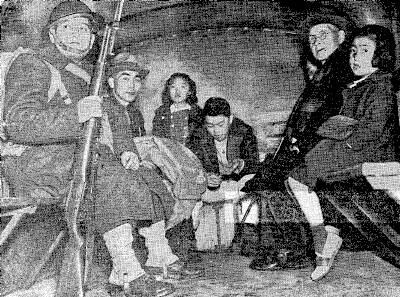
Army to Out Japs In L. A. Harbor Area
SAN FRANCISCO, March 30. --(AP)-- The army issued its second evacuation order of the war tonight, setting a deadline of noon next Sunday, April 5, for the removal of all Japanese -- citizens and aliens -- from two critical areas in the Los Angeles harbor district.Previously, all persons of Japanese ancestry had been ordered cleared from Bainbridge Island in Puget Sound.
Lieut. Gen. J. L. DeWitt's second exclusion order affects some 3,000 persons, who must evacuate the prescribed areas on Friday, Saturday and Sunday, to the new assembly center at the Santa Anita race track, east of Los Angeles. Santa Anita will house the group pending their removal to reception centers, such as the new colony at Manzanar, or other designated locations.
In the movement, approximately 500 persons from each area will be moved on each of the three days, the army said. Evacuees will be permitted to proceed to Santa Anita by private automobile or in supervised groups.
No Japanese evacuated from Western military areas will receive a greater net cash wage than the minimum $21 a month now paid the American soldier, two federal agencies announced today.
While emphasizing that the government has not determined how much it expects to pay evacuees put to work to further the war effort, the War Relocation Authority and the Wartime Civil Control Administration added:
"The minimum net cash wage of the American soldier, $21 a month, will be the maximum net cash wage of evacuated persons working on public projects for whom subsistence and housing are provided."
JAPS REGISTER WHILE WORKING
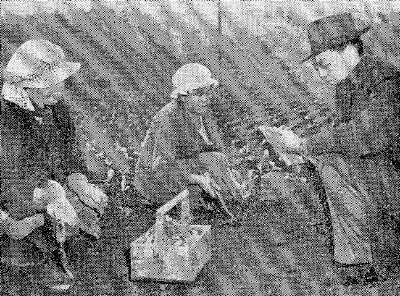
Bankers Discuss Problem Of Moving Aliens; Open Office
Moving almost with all possible speed, federal banking officials, headed by M. S. Szymczak of San Francisco, member of the board of governors of the Federal Reserve System, met with Seattle bankers at luncheon today to discuss complicated economic problems connected with removal of enemy aliens from Seattle and vicinity.Szymczak, along with other Federal Reserve officials, learned only Monday that the Federal Reserve Bank of San Francisco and its branches were to be alien-property custodians.
Since then he has directed the opening of an office in each of the Pacific Coast cities from which aliens are to be evacuated and in which there also are branches of the bank.
In Seattle such an office was opened yesterday at l09 Second Ave. It was doing business today.
Prompt Action Needed
Szymczak, who came to Seattle with Clarence Shaw, managing director of the Seattle branch of the bank, after a conference in San Francisco with Lieut. Gen. John L. De Witt, commanding general of the Western Defense Command, explained that moves have come so fast, the offices have been opened before the rules and regulations of their procedure were completed. "We're in the position of 'a friend to the court'," Szymczak explained.
"We wish to emphasize that the compulsion lies only in the evacuation order. Contact with us is voluntary.
"We are here to help aliens, to act as 'contact man' between them and someone to take over, rent or buy their property. We are going to keep them from being 'gouged' or cheated. We don't want anyone to take advantage of them, and wish them to know and believe that."
Each Individual Problem
The official said one difficulty in setting up rules for property handling lies in the fact that each alien presents an individual problem.
"One man may be a farmer who wants someone else to work his farm," Szymczak explained. "Another may wish to sell. Another may be a store or hotel keeper. It is impossible to lay down broad rules to cover all situations."
Dates for the evacuation will be decided by military authorities, but the bank's offices are being set up at once to handle the cases of those aliens who desire to move before evacuation is ordered.
Offices similar to the one opened here yesterday probably will be opened soon in Tacoma, Kent, AuCentralia, and other Northwest towns.
Alien Cooperation Urged
The governor pointed out that removal of 7,000 Japanese from the immediate vicinity of Seattle, without proper means of handling property, could have serious economic effect on all other residents.
He urged Japanese, German and Italian aliens to seek the bank's aid. He said efforts will be made to find trustees, renters or buyers.
Szymczak will go to Portland tomorrow for similar conferences. Then he will go to Los Angeles.
Shaw, assisted by R. T. Symms, assistant manager of the Seattle branch, will direct activities of the Pacific Northwest offices, including the one here.
Aliens unable to visit the office may telephone Eliott 2732, Shaw said.
JAPAN SOCIETY HERE DISSOLVED
Seattle's Japan Society is no more, it was learned today.The organization, formed to foster friendly relations with Japan, has been dissolved, and its funds invested in defense bonds.
A committee consisting of George H. Greenwood, banker, and Corwin Shank and Harry B. Jones, attorneys, was appointed to care for the dissolution details by the society's board of trustees, and now has completed the job, Greenwood said today.
The membership list of the society contained many prominent Seattle names. Approximately one-third of the members were Japanese, Greenwood estimated.
Yuki Sato, who was Japanese consul in Seattle until the war started, was first vice president of the society. Sato, as well as some other Japanese members, has been interned by the United States government.
The bonds purchased with the society's funds have been placed in a "blocked safekeeping account." The reason for this is that the Japanese members are presumed to have an interest in the fund, Greenwood explained, and their "shares" could not be distributed among them because of financial restrictions placed on Japanese aliens.
Fourteenth Amendment
To The Post-Intelligencer:We hear a great, deal of talk about the real need for moving Japs -- citizen and alien alike -- from Pacific Coast areas. This is a necessary and vital precaution and should be done quickly and thoroughly.
Japan never has recognized our right to declare that Japs born here are citizens and always insisted they were Jap nationals. At the same time, Japan, by means of various tricks and devices such as picture brides, has encouraged the birth of more and more Japs here.
The presence of a great many citizen Japs in this country would be of immense value in case of war.
It's high time that we begin to repair our fences. Let's amend the constitution and pass the necessary laws so no more Japs will be born citizens.
The time to make this change is now while we are all thinking about it and while we realize the danger. If the Japs do not succeed in this war, there may be a next time, and the dangers from this infiltration by citizenship will be greater than ever.
If there be those who would say we can't do this to citizens, let them remember that we took this country from the Indians, killed thousands of them, arbitrarily moved other thousands from their homes to far-distant lands, and to this day have denied them the rights, privileges and duties of citizenship. If we could do that to the Indians, we can do something about the Japs.
Let's do it now!
W. M. MASON, Seattle.
Japanese Problem
To The Post-Intelligencer:The removal of the Japanese may boomerang into a greater act of self-sabotage than any sabotage apt to result from a well policed restriction of their activities.
Seventy million pounds of vegetables, fruit and berries are produced annually by Japanese truck gardeners. Economists estimate a 100 per cent increase in the price of fresh produce and a 25 per cent increase in the price of canned produce if the Japanese are removed. The effect on inflation is one point to consider, but the critical point is the effect upon the nation's health.
The bulk of the population cannot afford to buy vitamin-content pills. The planting of gardens is possible for only a minority of the nation, and many of these are too soft to last through weed-pulling and canning. Summer consumption is not enough to protect the health of the nation; canned goods must be prepared to carry the people through sunless winters.
The evacuated Japanese also will become a great problem, along with that of social adjustment Only a fraction of the 100,000 or more to be moved will be able to find subsistence employment. They will become an additional load for the taxpayer to support, at a cost of many millions a year. Unmoved, they can enrich the nation as they have done these many years.
R. B. JOHNSON, Seattle.
JAPS HERE MAY BE SENT TO IDAHO
Possibility that Seattle Japanese will be sent to Idaho was seen in an announcement by the Army today that a reception and relocation center will be established near Eden in Jerome County for 10,000 evacuees from the Pacific Coast.Col. Karl R. Bendetsen, assistant chief of staff of the Western Defense Command and Fourth Army. said valuable development work will be done by the Japanese on 68,000 acres of Idaho public land, according to the Associated Press.
Gov. C. A. Clark of Idaho announced he had been informed that the Japanese would put the land under cultivation, would be kept on the project only for the duration of the war and would be removed thereafter. The land is included in the Minidoka Reclamation Project and the biggest part of the 68,000 acres is fertile soil.
First Northern Center
Colonel Bendetsen did not designate from what areas the Japanese would be sent to the project but as this is the first center established in a northern area it was assumed here that Japanese from Seattle and vicinity would be sent there.
About 2,000 Japanese in two Seattle areas will begin registration for removal tomorrow morning at 8 o'clock. Registration will continue Sunday and all Japanese in the areas will be taken to the assembly center in Puyallup by noon of May 1. Registration of 2,500 more California Japanese began today.
Seattle Japanese who live in the general area lying north of Jackson Street and West of Fifth Avenue, Fairview Avenue and Roosevelt Way will register at 2100 Second Ave.
Those living in the general area south of Jackson Street will register at 1319 Rainier Ave. No exclusion order has been issued for the remainder of the city but one is expected soon.
Farm Appeal Repeated
Removal of Japanese in other areas of King County is planned next month.
The Farm Security Administration renewed its appeal today for farmers to take over Japanese operations in this area. Charles A. Agers, field agent, said arrangements can be made for purchase, lease or management of the farms. Those interested may register at the Wartime Civilian Control Administration Office, 808 Second Ave.
Organization, under a self-government basis, of the staff of Japanese-Americans who will administer affairs at the assembly center at Puyallup has been completed.
Persons going to the Puyallup assembly center have been ordered to take bedding and linen, china and silverware, toilet articles, extra clothing and personal effects. Mattresses will not be required, nor will cooking utensils. Persons will eat in central mess halls.
Nisei Farewell
To The Post-Intelligencer:The time draws near for us to say good-by to Seattle and its friendly environment -- the only home most of us have ever known.
Our hearts were heavy when we heard that we, the offspring of the first generation Japanese who had settled on these shores, would have to move inland with our elders.
It is with mixed emotions that we say good-by to our many friends. We shall miss the beautiful mountains, the salty, tangy sea air, the temperate climate, but most of all our kind, friendly neighbors. First and foremost, we go with the full realization that we are Americans. We go without resentment or rancor, but with a deep abiding faith in the American government and people, knowing that justice and fair play will be the first consideration shown us in dealing with our evacuation problem.
A warm "thanks" to all you sympathetic people who have gone out of your way to give us a smile, a word of encouragement, a firm grip of the hand. You will never know how much these gestures have meant to us, for we are not of a demonstrative nature.
VIOLET YOKOYAMA, Seattle.
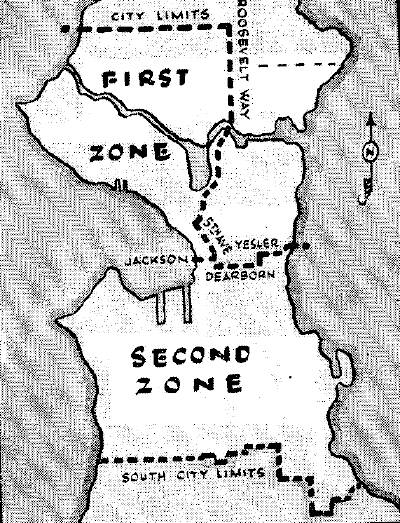
RESIDENTS OF 2 DISTRICTS TO REGISTER FOR REMOVAL
Trek to Puyallup Center Will Be Started
Tuesday
Continue on Thursday and Friday, Under Army Order
Continue on Thursday and Friday, Under Army Order
Two thousand Japanese from two districts in Seattle will be evacuated next week, it was announced today in San Francisco by Lieut. Gen. John L. De Witt, commander of the Fourth Army and the Western Defense Command.
Soldiers will be detailed from Fort Lewis to handle the removal. Japanese will be removed from two areas in Seattle, under the present orders. The areas generally are the northwest section of the city and the entire South East.
Their detailed designations folk??? 1. All that portion of Seattle within the boundary beginning from the point at which the north city limits meet Shilshole Bay; then easterly and following the northerly limits to Roosevelt Way, thence southerly and following Roosevelt Way, Eastlake and Fairview Avenues, Virginia Street and Westlake Avenue to Fifth Avenue; thence southwesterly in Fifth Avenue to Yesler Way, thence easterly in Yesler Way to Maynard Avenue; thence southerly in Maynard Avenue to Jackson Street; thence westerly in Jackson Street to Elliott Bay, and thence northwesterly and northerly and following the westerly city limits to the point of beginning.
2. All that portion of Sea??? lying generally south of an east-west line beginning at the point which Jackson Street meets El??? Bay; thence easterly along Jackson Street to Fifth Avenue South?; thence southerly in Fifth Avenue South to Dearborn Street; thence easterly in Dearborn Street to ??? Avenue; thence northerly in ??? Avenue to Yesler Way and thence easterly in Yester Way to I??? Washington.
The garden areas adjacent to the city are expected to be included in further orders.
The Seattle evacuation is pa??? a general border which calls for evacuation of 12,800 Japanese from the Pacific Coast during the next ten days.
All Japanese in Area No. 1 must register Saturday and Sunday between 8 o'clock in the forenoon and 5 o'clock in the afternoon at 2100 Second Ave.
Those who are in the second area must register on the same days and during the same hours at 1319 Rainier Ave. The evacuees in the two districts will proceed, or will be transported, to the assembly center at Puyallup next Tuesday, Thursday or Friday, as indicated when they register.
The Army asked that the head of each family register for the entire family, thus saving time. Evacuees will be permitted to use automobiles to transport themselves to the assembly center, the Army said, if such automobile is registered in advance. Those not having transportation will be taken to Puyallup by train or bus.
Col. Karl R. Bendetsen, assistant chief of General De Witt's staff, said the tempo of evacuation is being increased all along the Coast.
The Seattle evacuation will be the first since the removal of 239 Japanese from Bainbridge Island late in March.
The next move here, it was expected, will be the removal of remaining Japanese in Seattle, those in the valleys to the south and those on Vashon Island.
The agricultural division of the Wartime Civilian Control announced today that 70 per cent of Japanese farm lands have been transferred to other operators.
Most of the transfers have been made in California, it was said, and operators still are being sought for Japanese farms in the Puget Sound area.
SEATTLE JAPANESE TAKE OATH OF U. S. ALLEGIANCE
Members of League Pledge War Aid To
America
By Walter Rue
By Walter Rue
Five young Japanese women stood before Attorney Clarence Arai in a room at 513 Main St. at 1 p. m. yesterday, raised their right hands and swore allegiance to the United States of America.
Each one repeated the oath as Arai read from a paper:
"I, the undersigned, do solemnly swear that I will support and defend the constitution of the United States of America against all enemies, foreign and domestic; that I will bear true faith and allegiance to the same; that I do hereby forswear and repudiate any other allegiance which I knowingly or unknowingly may have held heretofore; and that take these obligations freely, without any mental reservation whatsoever or purpose of evasion. So help me God."
PAPERS SIGNED
The girls then signed papers containing the oath, thus becoming the first of several hundred members of the Seattle chapter, Japanese American Citizens' League, to reaffirm their love for this country and their determination to fight for its preservation.
All afternoon and well into the evening the same scene was repeated again and again as 303 league members came to take the oath, be fingerprinted and photographed and give essential information so the organization may issue identification cards.
No one was registered, Arai said, who did not have his or her birth certificate, or other conclusive proof of birth in the United States.
'PROUD OF U. S.'
William Hosokawa, one of the league's 400 members, expressed the sentiment of all when he said:
"We're proud to do this because we're proud of the United States. It is true that some of the Nisei Japanese (those born here) were registered with the Japanese consul and thus were supposedly citizens of Japan as well as this country, but it was done when they were babies and couldn't speak for themselves."
Arai added that he and all other members of the league want America to win the war against Japan and hope that it's speedily accomplished.
PLEDGE AID
"We love this country and we'll de our part to preserve it," he said.
There are about 6,000 Japanese in Seattle, 3,500 of whom are citizens, according to officers of the league. In Western Washington there are 12,000 altogether, most of them concentrated in King, Pierce and Kitsap counties.
The local chapter of the Japanese-American Citizens' League is one of sixty-six in the West. National headquarters are now in San Francisco, but will be moved to Salt Lake City when the Japanese are ordered to leave the Pacific Coast military zones.
The purpose of the league, Arai and Hosokawa said, is to foster the spirit of Americanism in the Japanese colony and aid the younger generation in solving social and economic problems.
ABOUT LANGUAGE
Contrary to general belief, only a few of the Nisei Japanese understand the official Japanese language sufficiently well to be able to read Japanese newspapers, according to Hosokawa.
"At the Japanese language schools here they go to school one hour a day for the equivalent of six school years, but that's not enough to get much beyond the stage of baby talk," he said.
"It has been estimated that one and one-half years of applied study is necessary to master the Japanese language, and the Nisei aren't going into it that deeply. They're more interested in the American language and the American way of life."
Subchapters of the Seattle league will be conducting registrations this week at Bellevue and Winslow. The same program is being allowed in all other cities and was where the league has locals.
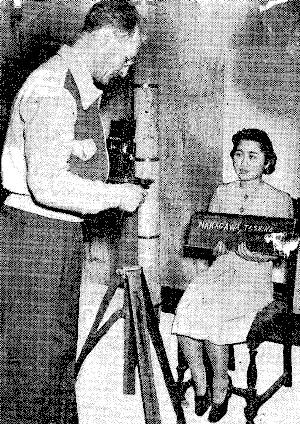
WHERE ORDER HITS
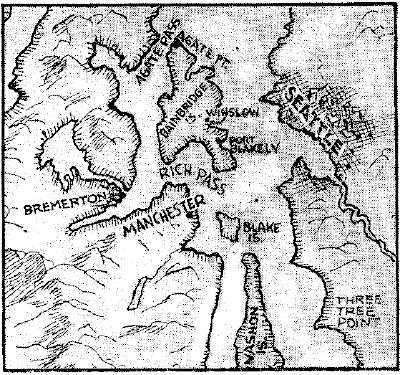
DEADLINE SET AS MARCH 29; 274 AFFECTED BY COMMAND
All Found There After That Date to Be
Forcibly Removed; First
Compulsory Action
Forcible evacuation of all Japanese, aliens and native born, from Bainbridge Island was ordered yesterday by the army, effective Monday, March 30.
The order, signed by Lieut. Gen. J. L. Dewitt, commanding general of the Western Defense Command and Fourth Army, was the first compulsory exclusion action taken by the army against West Coast Japanese.
Evacuations already under way in other areas along the Pacific Coast are still on a voluntary basis.
Not only does the western side of the island overlook the navy yard and the channels through which all ships must pass but several naval and military establishments are located on the island. Japanese on the island are fishermen, gardeners and dairymen.
PROCEDURE TOLD
The army, an Associated Press dispatch from San Francisco said, outlined the Bainbridge Island procedure, which will set precedent for future compulsory evacuations, as follows:
Notices will be posted tomorrow on the island, directing all Japanese to report to a newly established service and control center set up near the ferry landing by the Fourth Army's wartime civilian control administration.
The affected Japanese will be instructed that they can leave voluntarily for places of their own choosing, if also approved by the army, between tomorrow and March 29.
Each Japanese will be assigned a number.
WILL BE REMOVED
On March 30, all Japanese left on the island will be called up according to their assigned number sequence, fingerprinted and given medical examinations.
In custody of soldiers assigned by Maj. Gen. Kenyon Joyce, commanding general of the Northwest sector, they will be taken to Owens River Valley, Calif.
A reception center for Japanese already has been constructed by the army in the valley at Manzanar, 270 miles northeast of Los Angeles.
I. Nagatani, chairman for Bainbridge Island of the Japanese American Citizens League, said last night that Bainbridge Island Japanese have made no definite plans for evacuation, although they have been working on the problem.
"We have been trying to arrange to get a large farm, which we can handle cooperatively," he said. "So far we haven't been successful, but I am going to Seattle tomorrow to see if the government will not help us. We have a large amount of farm equipment which we would like to take with us."
Nagatani said there are forty-three Japanese families on the island, totaling 274 persons. Of these all are American born except eighty-three.
Both Nagatani and James Y. Sakamoto, blind editor of the Japanese-American Courier and a leader of the young Japanese, expressed surprise at General DeWitt's order that they will be taken to California unless they can make other arrangements during this week.
"I talked to army officials about this last week," Sakamoto said, "and I understood that Northwest Japanese would be kept in the Northwest. This seems to be a new development."
Walter C. Woodward Jr., publisher of the Bainbridge Review, said the evacuation order would have a far-reaching effect in the economy of the island. It will take away about one-seventeenth of the island's population, and will seriously cripple the strawberry industry.
AREAS SET UP
There are approximately 150 Japanese pupils in the schools, and the school districts will lose the 25 cents a day per pupil which they receive from the state. The school board had already indicated that they will try to arrange for the graduation of those students who would have finished high school in June, Woodward said.
Property interests of the evacuated Japanese will be taken over on their departure by the Federal Reserve Bank and in case of farmholdings, by the department of agriculture.
Authority to order the Japanese out of the island was granted to General DeWitt recently in a presidential proclamation, under which vital coastal military areas can be cleared of residents the army considers dangerous to the national defense.
General DeWitt's first move after receiving the authorization was to set up two military areas embracing the states of California, Oregon, Washington and Arizona.
Later, he extended the areas to include Utah, Idaho, Montana and Nevada, and designated hundreds of prohibited zones from which aliens were specifically barred.
General DeWitt, stressing that all moves were dictated entirely by military necessity, indicated he considered American-Japanese potentially more dangerous to the nation's welfare than German or Italian aliens.
MAN, WHO DRAGGED JAP BOY PATROLMAN FROM HIS POST, FINED
Charged with dragging a Junior Safety Patrol member from a school crossing April 16 because the boy was a Japanese, Karl R. Paykull, 67 years old, was found guilty of disorderly conduct and fined $25 in Police Court today.Paykull, an engineer living at 1258 John St., testified he did not believe it was right for Japanese to be members of the patrol and that he merely wanted to take the boy to police headquarters to see if the Japanese had that right.
The boy, Roy Tsuboi, 11, American born, testified he was on duty at Denny Way and Stewart Street when Paykull grabbed him.
"He pulled me about half a block down the street," Roy testified. "He was waving his cane and stopped a car. He told me to get in the car. When I did, the driver told me to get out the other side. I did."
Paykull said:
"I can't understand why a Japanese should be on the patrol when we are at war with Japan."
Judge James Hodson replied:
"If we were at war with Ireland, do you think we should discharge all Irishmen from the New York Police Department?"
Paykull replied it wouldn't seem right to have them on the force.
"There is no racial prejudice in the Junior Safety Patrol," continued Judge Hodson. "This boy was born here and has every right of an American citizen."
City Attorney Bruce MacDougall then asked Paykull if he was born in the United States.
"No," said Paykull.
Paykull did not say in court where he was born, but when he was arrested he gave his birthplace as Sweden.
PUYALLUP CAMP FOR 8,000 JAPS
Job Done in But Seventeen Days; Half of
Estimated Million Dollar Cost
Saved
By Carlton Fitchett
Post-Intelligencer Staff Correspondent
By Carlton Fitchett
Post-Intelligencer Staff Correspondent
PUYALLUP, April 16. -Puyallup's new Japanese assembly center was ready for occupancy today after United States district army engineers had completed the seeming miracle of building quarters for a city of 8,000 in just seventeen days.
Not only that, but the job that was originally to have cost an estimated one million dollars, cost only about half that in the taxpayers' money.
The engineers took over the job on March 30, when the contractor quit after deciding that it would be impossible to complete the huge task by the April 15 deadline.
FAST ACTION
The first day there were only two carpenters on the job, the second sixteen, but by the end of the week O. R. Lunn, resident engineer for the United States army engineers, had a crew of 1,100 carpenters and laborers working on an around-the-clock basis.
At 11:30 a. m. on April 9 orders were received from San Francisco to build a 100-bed hospital in connection with the assembly center.
The hospital was finished today and army medical corps officers began moving in equipment late in the day. In the seventeen days carpenters used five million board feet of lumber in building the new assembly center.
WELL HEATED, LIGHTED
The dwelling units are scattered among auto scooters, roller coasters, the fun house and other concessions on the Western Washington Fair Grounds. Sixty-four of the barracks cover the fair grounds and 250 bachelor apartments have been constructed in the areas under the grandstands.
Three other housing areas have been built on parking lots and fields adjoining the fair grounds. The largest of these, designated as Area A, will accommodate 3,000 people. It contains ninety-six buildings for living quarters, six mess halls and twelve bath houses.
Area B, which will accommodate 1,200 People consists of forty residence buildings, six mess halls and six bath houses.
Area C, to accommodate 900 people, consists of thirty buildings, two mess halls and four baths.
The barracks, though simple in construction, are well lighted and will be heated with wood stoves.
All of the residents will supply to make their own furniture and will eat at the mess halls.
A small army detachment, such as is assigned to guard all government property, had moved into barracks near the center yesterday.
The commanding officer is Capt. C. H. Ferris. The management of the camp, however, will be entirely in civilian hands.
The Puyallup center, first of its kind established in this state, will be in charge of R. F. Turner. He was chosen as the assembly center's manager by the war time Civil Control Administration.
JAPANESE VILLAGE
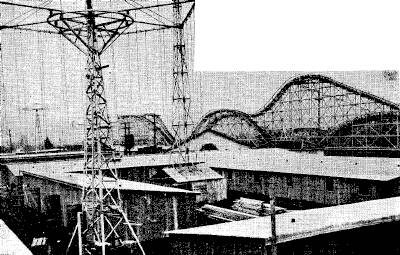
Western Washington Fair Grounds. In the background can be seen the breath-taking scenic railroad and in the foreground a giant swing. The ferris wheel is near by. --(Picture by Post-Intelligencer Staff Photographer.)
EMPTY STALLS -- EVACUATION
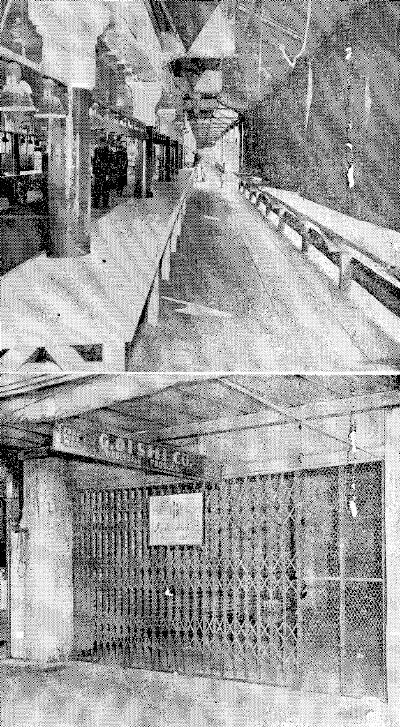
HALF OF CITY'S JAPS HAVE GONE
Seattle's central business district gave the appearance of a city without Japanese today as the last of them from Zones No. 1 and 2, or population, departed for the assembly center in Puyallup. And the Pike Place markets, for the first time in their years of operation, did business without their myriad of Japanese-operated stalls.It is estimated that only about half the Japanese of the city have been removed but those who have gone were from areas in which many were engaged in business and where they most often met the public.
Those Japanese remaining in the city are restricted to movement within the area in which they live.
Beginning at noon, they and all others of the Japanese race were banned from going to the central business district, the waterfront or any place in the area to the north of the city that lies west of Eastlake Avenue and Roosevelt Way, any place west of Fifth Avenue in the central area, or any place south of Jackson Street in the southern area, except for one small locality between Jackson and Dearborn Streets.
This ban prevents any Japanese in the farming community surrounding the city from delivering produce to Seattle firms personally, as Produce Row and the markets cannot be reached without passing through a restricted area.
The market master of the municipal market said that not a single Japanese merchant appeared this morning, although the ban did not go into effect until noon.
Operators of private markets said several Japanese renters at stalls came early this morning with produce but brought Filipinos with them to tend the stalls and left before noon.
The contingent of Japanese which left Seattle for Puyallup today swelled the population of Camp Harmony, the assembly on the Western Washington Fair grounds, to more than 2,000. About 200 Japanese are there from Alaska.
No date has been set for removal of the Japanese from University, Capitol Hill and First Hill Districts, or the rural areas of the county. Such an order is expected soon, as the Army has announced that the removal program will be rushed as fast as possible.
[incomplete article]
JAPANESE ON BAINBRIDGE REMOVED WITHOUT HITCH
Both Parties Praised For Cooperation In
Task
(Continued from Page 1)
to make the parting easier and soldiers did everything possible, performed their task with gentleness and consideration.
The evacuation from the highly strategic island adjoining the Puget Sound Navy Yard was ordered a week ago by Lieut. Gen. J. L. DeWitt, commanding general of the Western Defense Command and the Fourth Army.
The Bainbridge Island Japanese, a vast majority of whom are young people born on the island, were taken to Seattle by special ferry, were placed on board a special train on the Seattle waterfront and last night they were on their way to their new home in Owens Valley, Calf., for the duration.
The climax of the week of preparation began shortly after 8 o'clock yesterday morning when fifteen army trucks in twos and threes began their final rounds. In one truck was placed bedding and personal effects. In the other, the Japanese themselves were given seats.
The soldiers found most of the Japanese waiting on the doorstep with their luggage. Before leaving, the housewives had to go back inevitably for a last look around the house to see that everything was in order. On most of the farms, Filipinos had taken over and the friendliest of feeling apparently existed between the two races. Not a few Japanese were motored to the boat by their Filipino caretakers.
Each set of trucks was accompanied by a Japanese youth acting as a guide. Soldiers helped frail old people into the trucks and carried the youngsters who liked the friendly big men in their spick and span uniforms.
The army, however, was defeated in the only engagement reported. When Mr. and Mrs. Y. Moji climbed into the truck, their big Alaska husky, King, jumped in with them.
GOODS STORED
Two strapping big soldiers, Tony Bova and Sal Calabrese, attempted to remove him, but when King bared his teeth and growled viciously they changed their tactics. Mrs. Moji obligingly took the dog into the house and left him with two Filipinos who will run their farm, and returned.
Incidentally, many American neighbors took over the pets of their Japanese friends, the animals, including a miscellaneous collec
[abruptly starts here]
sen and H. Bromley. To avoid a crowd and spare them the pain of farewell with their American friends, the Japanese were assembled at the more remote landing of Eagledale, across the harbor from Winslow.
[abruptly starts?]
Island. Few had ever traveled farther than Seattle. Almost none had ever been on a train until yesterday. A patriarchal figure among the evacuees was Kihachi Kirakawa, the venerable pastor of the Japa
[abruptly starts?]
into the cars, while seven army truck loads of luggage were placed in baggage cars.
The entrainment was witnessed by thousands of people who jammed the Colman Dock overhead viaduct and Alaskan Way sidewalks.
TRAIN SOON ON WAY
In twenty minutes after the ferry landed, the special train was on its way. Maj. C. F. Bisenius, who conducted the evacuation un
[abruptly ends]